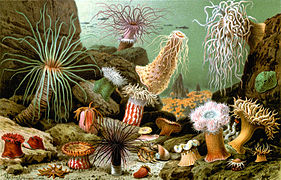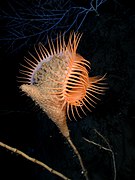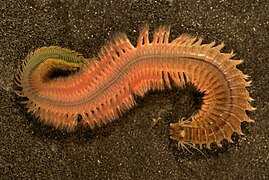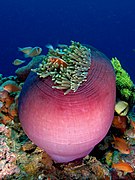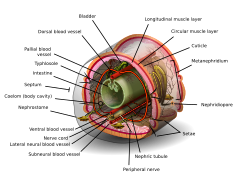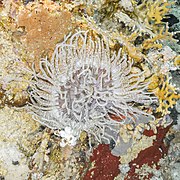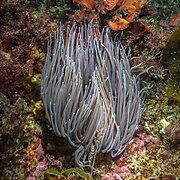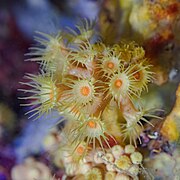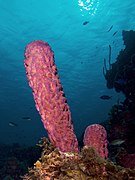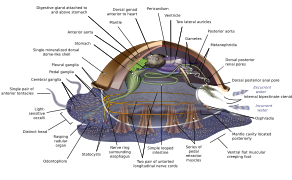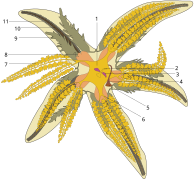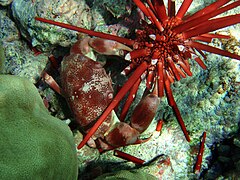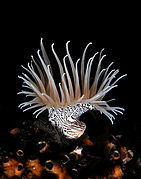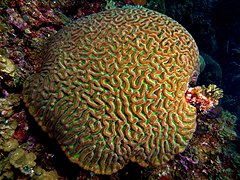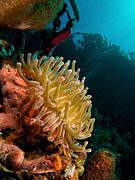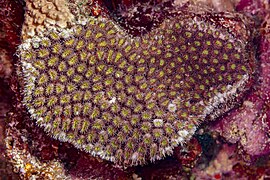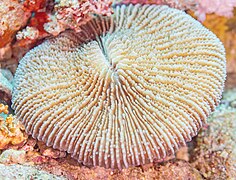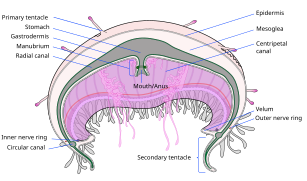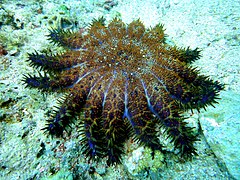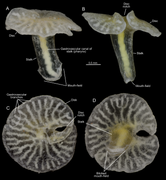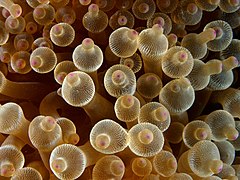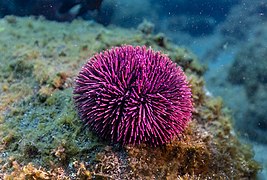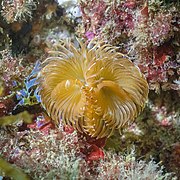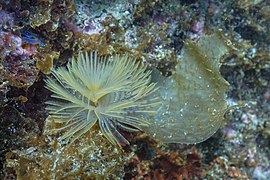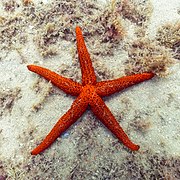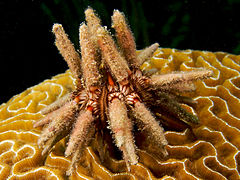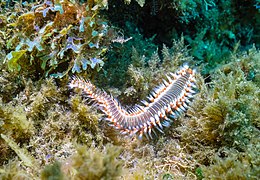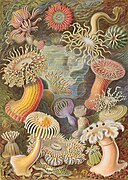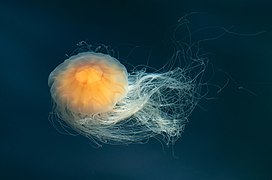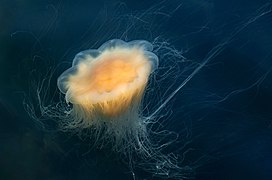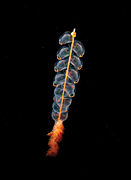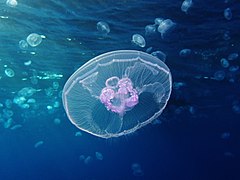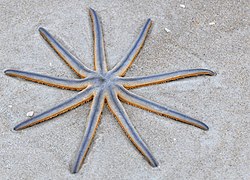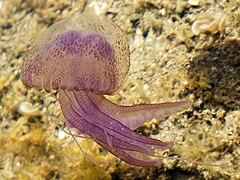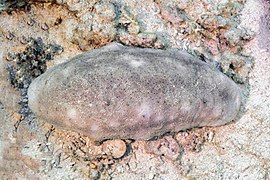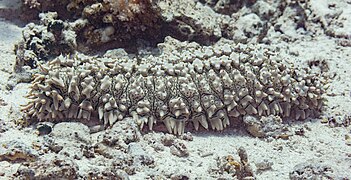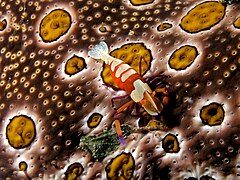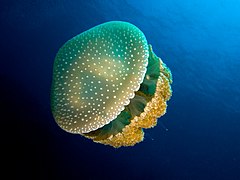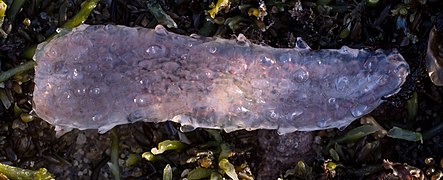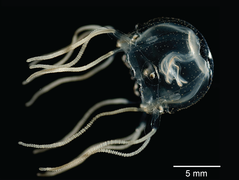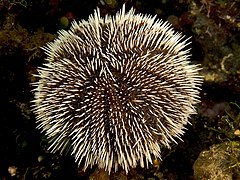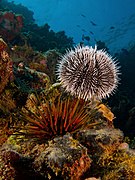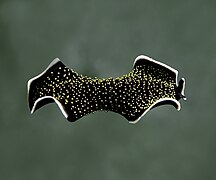Wikipedia:WikiProject Animals/Recognized content
Appearance
| This is a list of recognized content, updated weekly by JL-Bot (talk · contribs) (typically on Saturdays). There is no need to edit the list yourself. If an article is missing from the list, make sure it is tagged (e.g. {{WikiProject Animals}}) or categorized correctly and wait for the next update. See WP:RECOG for configuration options. |
 Featured articles
Featured articles
[edit] Apororhynchus
Apororhynchus Australiformis
Australiformis Bird
Bird Cooperative pulling paradigm
Cooperative pulling paradigm Edward Drinker Cope
Edward Drinker Cope Gigantorhynchus
Gigantorhynchus Heptamegacanthus
Heptamegacanthus Icelandic Phallological Museum
Icelandic Phallological Museum Leech
Leech Starfish
Starfish Viatkogorgon
Viatkogorgon
Total pages in content type is 11
 Former featured articles
Former featured articles
[edit] Introduction to evolution
Introduction to evolution Fauna of Australia
Fauna of Australia Fauna of Puerto Rico
Fauna of Puerto Rico Human
Human Myxobolus cerebralis
Myxobolus cerebralis Skunks as pets
Skunks as pets
Total pages in content type is 6
 Featured lists
Featured lists
[edit]Total pages in content type is 1
 Good articles
Good articles
[edit] Adaptive Coloration in Animals
Adaptive Coloration in Animals Ambush predator
Ambush predator Animal
Animal Animal Coloration (book)
Animal Coloration (book) Animal coloration
Animal coloration Animal epithet
Animal epithet Animal navigation
Animal navigation Annelid
Annelid Anthozoa
Anthozoa Anti-predator adaptation
Anti-predator adaptation Aonchotheca forresteri
Aonchotheca forresteri Aposematism
Aposematism Arthropod
Arthropod Bathyphysa conifera
Bathyphysa conifera Bioluminescence
Bioluminescence Black coral
Black coral Bonacynodon
Bonacynodon Brachiopod
Brachiopod Bryozoa
Bryozoa Bugula neritina
Bugula neritina Caenorhabditis elegans
Caenorhabditis elegans Cestoda
Cestoda Chitinozoan
Chitinozoan Cleaning symbiosis
Cleaning symbiosis Cloudinidae
Cloudinidae Cnidaria
Cnidaria Coincident disruptive coloration
Coincident disruptive coloration The Colours of Animals
The Colours of Animals Concealing-Coloration in the Animal Kingdom
Concealing-Coloration in the Animal Kingdom Coral
Coral Corallivore
Corallivore Hugh B. Cott
Hugh B. Cott Counter-illumination
Counter-illumination Crinoid
Crinoid Ctenophora
Ctenophora Dazzled and Deceived
Dazzled and Deceived Deimatic behaviour
Deimatic behaviour Destruction of ivory
Destruction of ivory Disruptive eye mask
Disruptive eye mask Dominance hierarchy
Dominance hierarchy Echinoderm
Echinoderm Echiura
Echiura Entoprocta
Entoprocta Euchambersia
Euchambersia Eukaryote
Eukaryote Eusociality
Eusociality Flatworm
Flatworm Gastrotrich
Gastrotrich Eleanor Glanville
Eleanor Glanville Gordodon
Gordodon Gorgonopsia
Gorgonopsia Histoire Naturelle
Histoire Naturelle History of Animals
History of Animals Holozoa
Holozoa Human
Human Human uses of animals
Human uses of animals Inequity aversion in animals
Inequity aversion in animals Jellyfish
Jellyfish Kimberella
Kimberella Life
Life Carl Linnaeus
Carl Linnaeus Mammal
Mammal Megawhaitsia
Megawhaitsia Millepora alcicornis
Millepora alcicornis Mollusca
Mollusca Nemertea
Nemertea On Growth and Form
On Growth and Form Ooedigera
Ooedigera Owha
Owha Pachysentis
Pachysentis Paora
Paora Parasites in fiction
Parasites in fiction Phoronid
Phoronid Savika
Savika Schinderhannes bartelsi
Schinderhannes bartelsi Scleractinia
Scleractinia Sea anemone
Sea anemone Sea urchin
Sea urchin Sipuncula
Sipuncula Skeleton panda sea squirt
Skeleton panda sea squirt Sponge
Sponge Structural coloration
Structural coloration Tardigrade
Tardigrade Transitional fossil
Transitional fossil Tunicate
Tunicate Twelves
Twelves Venom
Venom Vertebrate
Vertebrate Xenoturbella bocki
Xenoturbella bocki
Total pages in content type is 89
 Did you know? articles
Did you know? articles
[edit] ... that the Pacific lugworm must turn its esophagus inside-out when feeding? (2011-08-01)
... that the Pacific lugworm must turn its esophagus inside-out when feeding? (2011-08-01) ... that the sea urchin Abatus cordatus broods its young for nine months in pockets on its upper surface? (2020-07-23)
... that the sea urchin Abatus cordatus broods its young for nine months in pockets on its upper surface? (2020-07-23) ... that most fish leeches cling onto their hosts with suckers but Acanthobdella peledina uses hooked bristles for this purpose? (2018-05-21)
... that most fish leeches cling onto their hosts with suckers but Acanthobdella peledina uses hooked bristles for this purpose? (2018-05-21) ... that chitons, such as Acanthochitona crinita, are molluscs with a shell composed of eight separate articulating valves? (2020-01-24)
... that chitons, such as Acanthochitona crinita, are molluscs with a shell composed of eight separate articulating valves? (2020-01-24) ... that the sand burrowing brittlestar is often found in association with the sea potato? (2018-07-24)
... that the sand burrowing brittlestar is often found in association with the sea potato? (2018-07-24) ... that acroporid coral species Acropora abrolhosensis, A. anthocercis, A. awi, A. batunai, A. caroliniana, A. dendrum, A. derawanensis, A. desalwii, A. donei, A. echinata, A. elegans, A. hemprichii, A. hoeksemai, A. horrida, A. indonesia, A. kimbeensis, A. kirstyae, A. kosurini, A. loisetteae, A. lokani, A. microclados, A. multiacuta, A. paniculata, A. papillare, A. pharaonis, A. plumosa, and A. polystoma are all classed as vulnerable? (2015-08-13)
... that acroporid coral species Acropora abrolhosensis, A. anthocercis, A. awi, A. batunai, A. caroliniana, A. dendrum, A. derawanensis, A. desalwii, A. donei, A. echinata, A. elegans, A. hemprichii, A. hoeksemai, A. horrida, A. indonesia, A. kimbeensis, A. kirstyae, A. kosurini, A. loisetteae, A. lokani, A. microclados, A. multiacuta, A. paniculata, A. papillare, A. pharaonis, A. plumosa, and A. polystoma are all classed as vulnerable? (2015-08-13) ... that the coral Acropora aculeus is particularly susceptible to coral bleaching and coral diseases and is listed as a vulnerable species? (2017-11-22)
... that the coral Acropora aculeus is particularly susceptible to coral bleaching and coral diseases and is listed as a vulnerable species? (2017-11-22) ... that stagshorn corals such as Acropora pulchra and Acropora aspera are fed on preferentially by the crown-of-thorns starfish? (2013-02-15)
... that stagshorn corals such as Acropora pulchra and Acropora aspera are fed on preferentially by the crown-of-thorns starfish? (2013-02-15) ... that it is unclear if individual specimens of coral Acropora cytherea were being damaged by infestations of furry coral crab in the Chagos Archipelago in 2010? (2013-01-27)
... that it is unclear if individual specimens of coral Acropora cytherea were being damaged by infestations of furry coral crab in the Chagos Archipelago in 2010? (2013-01-27) ... that fragments of the coral Acropora grandis (pictured with hawkfish) have been successfully transplanted to a nursery bed and used to regenerate a damaged coral reef? (2013-04-02)
... that fragments of the coral Acropora grandis (pictured with hawkfish) have been successfully transplanted to a nursery bed and used to regenerate a damaged coral reef? (2013-04-02) ... that on the Great Barrier Reef, the coral Acropora loripes breeds synchronously five or six days after the full moon in November and December? (2013-05-31)
... that on the Great Barrier Reef, the coral Acropora loripes breeds synchronously five or six days after the full moon in November and December? (2013-05-31) ... that the Indian Ocean coral Acropora rudis is "endangered" by habitat destruction and its susceptibility to coral bleaching, disease and ocean acidification? (2017-07-21)
... that the Indian Ocean coral Acropora rudis is "endangered" by habitat destruction and its susceptibility to coral bleaching, disease and ocean acidification? (2017-07-21) ... that in the Southern Hemisphere, the coral Acropora secale normally spawns in November, six days after the full moon? (2013-01-12)
... that in the Southern Hemisphere, the coral Acropora secale normally spawns in November, six days after the full moon? (2013-01-12) ... that populations of Actinoporus elegans were thought to be restricted to the western Atlantic until they were collected at the east Atlantic islands of São Tomé and Príncipe in 2004? (2010-06-20)
... that populations of Actinoporus elegans were thought to be restricted to the western Atlantic until they were collected at the east Atlantic islands of São Tomé and Príncipe in 2004? (2010-06-20) ... that the sea cucumber Actinopyga agassizii has five teeth surrounding its anus? (2020-03-18)
... that the sea cucumber Actinopyga agassizii has five teeth surrounding its anus? (2020-03-18) ... that the hairy sea cucumber has long tube feet on its dorsal surface, giving it a furry appearance? (2020-02-13)
... that the hairy sea cucumber has long tube feet on its dorsal surface, giving it a furry appearance? (2020-02-13) ... that the brownfish is harvested commercially over most of its range despite being described by the IUCN as a vulnerable species? (2018-12-05)
... that the brownfish is harvested commercially over most of its range despite being described by the IUCN as a vulnerable species? (2018-12-05) ... that in times of food scarcity, the collared sand anemone may consume the symbiotic zooxanthellae in its tissues? (2021-06-30)
... that in times of food scarcity, the collared sand anemone may consume the symbiotic zooxanthellae in its tissues? (2021-06-30) ... that in Norwegian fjords, the sea anemone Actinostola callosa feeds heavily on the helmet jellyfish? (2017-07-19)
... that in Norwegian fjords, the sea anemone Actinostola callosa feeds heavily on the helmet jellyfish? (2017-07-19) ... that the sandalled anemone reproduces by longitudinal fission? (2018-10-06)
... that the sandalled anemone reproduces by longitudinal fission? (2018-10-06) ... that the sea anemone Adamsia palliata growing on the exterior of a gastropod shell inhabited by the hermit crab Pagurus prideaux is capable of enlarging the shell to better accommodate the crab inside? (2011-09-12)
... that the sea anemone Adamsia palliata growing on the exterior of a gastropod shell inhabited by the hermit crab Pagurus prideaux is capable of enlarging the shell to better accommodate the crab inside? (2011-09-12) ... that Adaptive Coloration in Animals was said to be the only zoology book ever to be packed in a soldier's kitbag? (2012-11-23)
... that Adaptive Coloration in Animals was said to be the only zoology book ever to be packed in a soldier's kitbag? (2012-11-23) ... that the rotifer Adineta ricciae gave up sex about 80 million years ago? (2012-12-11)
... that the rotifer Adineta ricciae gave up sex about 80 million years ago? (2012-12-11) ... that both animals and plants self-advertise? (2016-04-10)
... that both animals and plants self-advertise? (2016-04-10) ... that the African Wildlife Foundation is helping feed the only remaining West African Giraffes (pictured) in Niger? (2011-11-21)
... that the African Wildlife Foundation is helping feed the only remaining West African Giraffes (pictured) in Niger? (2011-11-21) ... that lettuce coral and thin leaf lettuce coral can both be considered "weed" corals? (2015-07-06)
... that lettuce coral and thin leaf lettuce coral can both be considered "weed" corals? (2015-07-06) ... that siltstone deposits have allowed three-dimensional fossils of the extinct mushroom crinoid to be excavated from Indiana? (2013-02-06)
... that siltstone deposits have allowed three-dimensional fossils of the extinct mushroom crinoid to be excavated from Indiana? (2013-02-06) ... that many orange elephant ear sponges are busy on an afternoon in late July shortly before the new moon? (2012-11-25)
... that many orange elephant ear sponges are busy on an afternoon in late July shortly before the new moon? (2012-11-25) ... that the elephant ear sponge is said to resemble a piece of tanned cow hide? (2012-12-01)
... that the elephant ear sponge is said to resemble a piece of tanned cow hide? (2012-12-01) ... that the brown tubular sponge often has a colonial coral living symbiotically on its surface? (2012-08-12)
... that the brown tubular sponge often has a colonial coral living symbiotically on its surface? (2012-08-12) ... that Aglantha digitale (pictured) has a slow swimming action but a rapid escape response? (2018-10-02)
... that Aglantha digitale (pictured) has a slow swimming action but a rapid escape response? (2018-10-02) ... that the sea anemone Aiptasia diaphana can produce new individuals when fragments of its base become detached? (2014-12-31)
... that the sea anemone Aiptasia diaphana can produce new individuals when fragments of its base become detached? (2014-12-31) ... that sea fans such as Leptogorgia sarmentosa and Eunicella singularis are sometimes overgrown by false coral? (2015-01-05)
... that sea fans such as Leptogorgia sarmentosa and Eunicella singularis are sometimes overgrown by false coral? (2015-01-05) ... that the soft coral dead man's fingers (pictured) can live for 20 years? (2011-06-02)
... that the soft coral dead man's fingers (pictured) can live for 20 years? (2011-06-02) ... that despite living in complete darkness at bathyal depths, the sea anemone Allantactis parasitica synchronises its breeding activity with the phases of the moon? (2017-08-01)
... that despite living in complete darkness at bathyal depths, the sea anemone Allantactis parasitica synchronises its breeding activity with the phases of the moon? (2017-08-01) ... that the nudibranch Okenia zoobotryon may contain the same anti-predator chemicals as its prey, the bryozoan Zoobotryon verticillatum? (2014-02-07)
... that the nudibranch Okenia zoobotryon may contain the same anti-predator chemicals as its prey, the bryozoan Zoobotryon verticillatum? (2014-02-07) ... that the honeysuckle tunicate often grows intertwined with the bryozoan Amathia vidovici? (2013-04-10)
... that the honeysuckle tunicate often grows intertwined with the bryozoan Amathia vidovici? (2013-04-10) ... that the megafauna on the seabed of the Porcupine Abyssal Plain is dominated by sea cucumbers such as Oneirophanta mutabilis, Psychropotes longicauda, and Amperima rosea? (2014-01-14)
... that the megafauna on the seabed of the Porcupine Abyssal Plain is dominated by sea cucumbers such as Oneirophanta mutabilis, Psychropotes longicauda, and Amperima rosea? (2014-01-14) ... that in the north of its range, the sea fan anemone lives on the northern sea fan and further south, on the broad sea fan? (2015-01-01)
... that in the north of its range, the sea fan anemone lives on the northern sea fan and further south, on the broad sea fan? (2015-01-01) ... that the sponge brittle star is often found living on the surface of the red tree sponge? (2012-10-05)
... that the sponge brittle star is often found living on the surface of the red tree sponge? (2012-10-05) ... that the burrowing brittle star submerges itself in mud and raises its arms to feed? (2019-03-23)
... that the burrowing brittle star submerges itself in mud and raises its arms to feed? (2019-03-23) ... that a build up in numbers of the brittle star Amphiura filiformis in the North Sea may have been caused by eutrophication? (2013-03-28)
... that a build up in numbers of the brittle star Amphiura filiformis in the North Sea may have been caused by eutrophication? (2013-03-28) ... that the Mekong giant earthworm can grow to a length of 2.9 metres (10 feet)? (2017-11-24)
... that the Mekong giant earthworm can grow to a length of 2.9 metres (10 feet)? (2017-11-24) ... that the Cinderella starfish normally fasts while brooding its young? (2019-03-10)
... that the Cinderella starfish normally fasts while brooding its young? (2019-03-10) ... that the starfish Anasterias rupicola feeds on the limpet Nacella macquariensis, sometimes hunting it in groups? (2012-07-09)
... that the starfish Anasterias rupicola feeds on the limpet Nacella macquariensis, sometimes hunting it in groups? (2012-07-09) ... that Andiva (fossil pictured), an enigmatic animal that lived 555 millions of years ago, perhaps had a convex carapace? (2013-02-02)
... that Andiva (fossil pictured), an enigmatic animal that lived 555 millions of years ago, perhaps had a convex carapace? (2013-02-02) ... that the sea anemone Anemonia sulcata is known as ortiguilla in southern Spain, where it is a popular seafood? (2019-08-18)
... that the sea anemone Anemonia sulcata is known as ortiguilla in southern Spain, where it is a popular seafood? (2019-08-18) ... that nematode Angiostrongylus vasorum lives in the hearts of dogs? (2009-11-28)
... that nematode Angiostrongylus vasorum lives in the hearts of dogs? (2009-11-28) ... that a family in Whitehorse, Canada, was so afraid of animal aggression that the parents went fully armed to walk their children to school? (2012-10-11)
... that a family in Whitehorse, Canada, was so afraid of animal aggression that the parents went fully armed to walk their children to school? (2012-10-11) ... that a 240-million-year-old animal latrine was dubbed "the oldest communal toilet"? (2014-01-06)
... that a 240-million-year-old animal latrine was dubbed "the oldest communal toilet"? (2014-01-06) ... that in 1873, J. J. Murphy proposed an inertial model of animal navigation in Nature, challenging Darwin's views? (2012-03-10)
... that in 1873, J. J. Murphy proposed an inertial model of animal navigation in Nature, challenging Darwin's views? (2012-03-10) ... that Plutarch believed that animals were more virtuous than humans? (2022-10-19)
... that Plutarch believed that animals were more virtuous than humans? (2022-10-19) ... that in addition to human spaceflight, there have been many animals in space, including monkeys, apes, mice, dogs, guinea pigs, frogs, rats, cats, tortoises, fish, newts, insects, snails, spiders and nematodes? (2004-04-17)
... that in addition to human spaceflight, there have been many animals in space, including monkeys, apes, mice, dogs, guinea pigs, frogs, rats, cats, tortoises, fish, newts, insects, snails, spiders and nematodes? (2004-04-17) ... that the Mediterranean feather star is often found clinging to sea whips? (2013-02-16)
... that the Mediterranean feather star is often found clinging to sea whips? (2013-02-16) ... that the larvae of the soft coral Anthelia glauca are brooded in a unique pharyngeal pouch? (2015-07-15)
... that the larvae of the soft coral Anthelia glauca are brooded in a unique pharyngeal pouch? (2015-07-15) ... that the glaucus pimplet can be distinguished from the closely related red speckled anemone by the sediment that sticks to its column? (2015-02-20)
... that the glaucus pimplet can be distinguished from the closely related red speckled anemone by the sediment that sticks to its column? (2015-02-20) ... that the diterpene Bipinnatin J can be isolated from the bipinnate sea plume? (2015-01-15)
... that the diterpene Bipinnatin J can be isolated from the bipinnate sea plume? (2015-01-15) ... that the basket star Astrobrachion constrictum is always found living in association with a black coral such as Antipathes fiordensis? (2018-04-02)
... that the basket star Astrobrachion constrictum is always found living in association with a black coral such as Antipathes fiordensis? (2018-04-02) ... that although related species usually infect several hosts, the parasitic nematode worm Aonchotheca forresteri is known only from the marsh rice rat? (2010-05-06)
... that although related species usually infect several hosts, the parasitic nematode worm Aonchotheca forresteri is known only from the marsh rice rat? (2010-05-06) ... that the yellow sponge Aplysina aerophoba turns blue when exposed to air? (2020-10-07)
... that the yellow sponge Aplysina aerophoba turns blue when exposed to air? (2020-10-07) ... that the sponge Aplysina cavernicola (pictured) has been used as a model organism to monitor the presence of isotopes such as americium-241 in seawater? (2020-04-15)
... that the sponge Aplysina cavernicola (pictured) has been used as a model organism to monitor the presence of isotopes such as americium-241 in seawater? (2020-04-15) ... that the yellow tube sponge appears bright greenish yellow in deep water because it emits fluorescent light? (2012-10-18)
... that the yellow tube sponge appears bright greenish yellow in deep water because it emits fluorescent light? (2012-10-18) ... that the crinoid Aporometra wilsoni broods its young in cavities in the feathery pinnules on its arms? (2019-04-29)
... that the crinoid Aporometra wilsoni broods its young in cavities in the feathery pinnules on its arms? (2019-04-29) ... that the Japanese sea cucumber can aestivate and remain in a dormant state for up to four years? (2012-06-15)
... that the Japanese sea cucumber can aestivate and remain in a dormant state for up to four years? (2012-06-15) ... that seven of the seventeen apostles that Swedish botanist Carl Linnaeus sent out died on their journeys? (2010-06-05)
... that seven of the seventeen apostles that Swedish botanist Carl Linnaeus sent out died on their journeys? (2010-06-05) ... that a male and female pair of sand stars, Archaster typicus, engage in pseudocopulation so that when they spawn, some two months later, they will do so simultaneously? (2012-04-18)
... that a male and female pair of sand stars, Archaster typicus, engage in pseudocopulation so that when they spawn, some two months later, they will do so simultaneously? (2012-04-18) ... that the scale worm Arctonoe vittata protects the keyhole limpet (shell pictured) with which it lives by attacking predatory starfish? (2017-09-22)
... that the scale worm Arctonoe vittata protects the keyhole limpet (shell pictured) with which it lives by attacking predatory starfish? (2017-09-22) ... that the yellow calcareous sponge may be overgrown by other organisms? (2012-11-23)
... that the yellow calcareous sponge may be overgrown by other organisms? (2012-11-23) ... that the tunicate Ascidia mentula may have a pea crab, bivalve mollusc or copepod living in its body cavity? (2013-06-05)
... that the tunicate Ascidia mentula may have a pea crab, bivalve mollusc or copepod living in its body cavity? (2013-06-05) ... that definitive hosts for the fluke Ascocotyle pindoramensis include a variety of birds as well as the marsh rice rat? (2010-05-10)
... that definitive hosts for the fluke Ascocotyle pindoramensis include a variety of birds as well as the marsh rice rat? (2010-05-10) ... that the deep water sea urchin Aspidodiadema jacobi may brood its eggs among its spines? (2012-03-11)
... that the deep water sea urchin Aspidodiadema jacobi may brood its eggs among its spines? (2012-03-11) ... that the peanut worm Aspidosiphon elegans reproduces by transverse fission? (2019-03-03)
... that the peanut worm Aspidosiphon elegans reproduces by transverse fission? (2019-03-03) ... that the solitary coral Heterocyathus aequicostatus often lives in symbiosis with a small worm that moves it around? (2019-03-12)
... that the solitary coral Heterocyathus aequicostatus often lives in symbiosis with a small worm that moves it around? (2019-03-12) ... that the male Forbes sea star (underside pictured) is sometimes castrated by Orchitophrya stellarum, a parasite which feeds on its gonads? (2012-05-24)
... that the male Forbes sea star (underside pictured) is sometimes castrated by Orchitophrya stellarum, a parasite which feeds on its gonads? (2012-05-24) ... that the starfish Asterina gibbosa cements its egg cluster to a rock while Asterina phylactica broods its young? (2013-11-09)
... that the starfish Asterina gibbosa cements its egg cluster to a rock while Asterina phylactica broods its young? (2013-11-09) ... that the seagrass asterina is a sequential hermaphrodite, starting life as a female and later becoming a male? (2021-07-14)
... that the seagrass asterina is a sequential hermaphrodite, starting life as a female and later becoming a male? (2021-07-14) ... that despite its bright colouring, the firebrick starfish is inconspicuous among the sponges and other organisms in its habitat? (2018-04-17)
... that despite its bright colouring, the firebrick starfish is inconspicuous among the sponges and other organisms in its habitat? (2018-04-17) ... that the fire urchin plays host to two species of shrimp as well as the zebra crab, Zebrida adamsii? (2021-07-26)
... that the fire urchin plays host to two species of shrimp as well as the zebra crab, Zebrida adamsii? (2021-07-26) ... that the furry sea cucumber can speed along at nearly two metres a minute (6 ft/min)? (2014-03-20)
... that the furry sea cucumber can speed along at nearly two metres a minute (6 ft/min)? (2014-03-20) ... that the northern cup coral often contains symbiotic zooxanthellae in its tissues, whereas the southern cup coral does not? (2015-03-03)
... that the northern cup coral often contains symbiotic zooxanthellae in its tissues, whereas the southern cup coral does not? (2015-03-03) ... that Cliona orientalis is a bioeroding sponge that tunnels into such corals as Goniopora tenuidens, Dipsastraea pallida, and Astreopora listeri? (2018-11-14)
... that Cliona orientalis is a bioeroding sponge that tunnels into such corals as Goniopora tenuidens, Dipsastraea pallida, and Astreopora listeri? (2018-11-14) ... that despite being structurally weakened, it may be beneficial to the porous star coral when the bivalve Lithophaga simplex bores into it? (2018-10-24)
... that despite being structurally weakened, it may be beneficial to the porous star coral when the bivalve Lithophaga simplex bores into it? (2018-10-24) ... that in 1989, the colonial coral Astroides calycularis expanded its range to the Adriatic Sea after previously being restricted to an area west of Sicily? (2015-01-11)
... that in 1989, the colonial coral Astroides calycularis expanded its range to the Adriatic Sea after previously being restricted to an area west of Sicily? (2015-01-11) ... that the comb star (Astropecten polyacanthus) contains a potent neurotoxin called tetrodotoxin? (2012-04-12)
... that the comb star (Astropecten polyacanthus) contains a potent neurotoxin called tetrodotoxin? (2012-04-12) ... that the giant basket star (pictured) climbs to an elevated position and spreads its arms to "fish"? (2015-09-25)
... that the giant basket star (pictured) climbs to an elevated position and spreads its arms to "fish"? (2015-09-25) ... that the urchin crab is named for its habit of carrying a sea urchin such as the false fire urchin (pictured) on its back? (2013-02-03)
... that the urchin crab is named for its habit of carrying a sea urchin such as the false fire urchin (pictured) on its back? (2013-02-03) ... that the tunicates Didemnum molle (pictured) and Atriolum robustum both brood their developing embryos? (2014-02-20)
... that the tunicates Didemnum molle (pictured) and Atriolum robustum both brood their developing embryos? (2014-02-20) ... that the adult tapeworm Australamphilina elongata is found in freshwater turtles, but how its eggs emerge from the host's body cavity is unknown? (2018-06-13)
... that the adult tapeworm Australamphilina elongata is found in freshwater turtles, but how its eggs emerge from the host's body cavity is unknown? (2018-06-13) ... that Australiformis semoni is a parasite that infests marsupials in Australia and New Guinea and whose infestation could cause debilitating ulcerative granulomatous gastritis? (2023-06-06)
... that Australiformis semoni is a parasite that infests marsupials in Australia and New Guinea and whose infestation could cause debilitating ulcerative granulomatous gastritis? (2023-06-06) ... that the acorn worm Balanoglossus gigas gives a strong iodoform-like smell when handled, possibly to ward off predators? (2023-05-09)
... that the acorn worm Balanoglossus gigas gives a strong iodoform-like smell when handled, possibly to ward off predators? (2023-05-09) ... that the orange cup coral (pictured) obtains part of its nutritional needs from carbon compounds dissolved in sea water? (2017-11-09)
... that the orange cup coral (pictured) obtains part of its nutritional needs from carbon compounds dissolved in sea water? (2017-11-09) ... that bamboo coral specimens (pictured) have been found that are 4,000 years old? (2009-05-19)
... that bamboo coral specimens (pictured) have been found that are 4,000 years old? (2009-05-19) ... that the Asian freshwater leech Barbronia weberi has invaded North Carolina? (2020-07-10)
... that the Asian freshwater leech Barbronia weberi has invaded North Carolina? (2020-07-10) ... that Pederson's shrimp, the spotted cleaner shrimp and the anemone mysid are all found living in close association with the ringed anemone? (2012-09-21)
... that Pederson's shrimp, the spotted cleaner shrimp and the anemone mysid are all found living in close association with the ringed anemone? (2012-09-21) ... that lilies grow two to three miles below the surface of the North Atlantic? (2014-12-19)
... that lilies grow two to three miles below the surface of the North Atlantic? (2014-12-19) ... that the gonads of jellyfish Bathykorus bouilloni (pictured) have not been observed? (2011-11-25)
... that the gonads of jellyfish Bathykorus bouilloni (pictured) have not been observed? (2011-11-25) ... that the jellyfish Bazinga rieki was named in part for the catchphrase uttered by Sheldon Cooper in The Big Bang Theory? (2013-08-09)
... that the jellyfish Bazinga rieki was named in part for the catchphrase uttered by Sheldon Cooper in The Big Bang Theory? (2013-08-09) ... that the colonial bryozoan Beania magellanica, widely distributed in the Southern Hemisphere, has recently turned up in the Mediterranean Sea? (2020-12-29)
... that the colonial bryozoan Beania magellanica, widely distributed in the Southern Hemisphere, has recently turned up in the Mediterranean Sea? (2020-12-29) ... that the Ph.D dissertation of taphonomist Kay Behrensmeyer suggested that sauropods were terrestrial? (2013-10-27)
... that the Ph.D dissertation of taphonomist Kay Behrensmeyer suggested that sauropods were terrestrial? (2013-10-27) ... that the comb jelly Beroe cucumis feeds on other comb jellies, particularly Bolinopsis infundibulum? (2015-03-23)
... that the comb jelly Beroe cucumis feeds on other comb jellies, particularly Bolinopsis infundibulum? (2015-03-23) ... that the comb jelly Beroe gracilis feeds on other comb jellies, swallowing them whole? (2021-09-01)
... that the comb jelly Beroe gracilis feeds on other comb jellies, swallowing them whole? (2021-09-01) ... that the comb jelly Beroe ovata can consume four times its body weight in a day? (2015-03-21)
... that the comb jelly Beroe ovata can consume four times its body weight in a day? (2015-03-21) ... that Bicellariella ciliata, Crisularia plumosa, Bugulina flabellata and Bugulina turbinata form part of a bryozoan "turf" on steep or vertical rock exposed to moderate water movement? (2021-08-28)
... that Bicellariella ciliata, Crisularia plumosa, Bugulina flabellata and Bugulina turbinata form part of a bryozoan "turf" on steep or vertical rock exposed to moderate water movement? (2021-08-28) ... that the sponge Biemna variantia broods its young, and can also reproduce by budding and fragmentation? (2020-09-06)
... that the sponge Biemna variantia broods its young, and can also reproduce by budding and fragmentation? (2020-09-06) ... that groups of social feather dusters sway in unison in the water current and retract into their tubes at the slightest disturbance? (2020-02-16)
... that groups of social feather dusters sway in unison in the water current and retract into their tubes at the slightest disturbance? (2020-02-16) ... that the worm Bispira volutacornis is sometimes parasitised by a copepod, several of which may move around among the feathery plumes? (2021-07-28)
... that the worm Bispira volutacornis is sometimes parasitised by a copepod, several of which may move around among the feathery plumes? (2021-07-28) ... that when boiled in milk, black coral (example pictured) emits a faint scent of myrrh? (2020-06-21)
... that when boiled in milk, black coral (example pictured) emits a faint scent of myrrh? (2020-06-21) ... that a fossil of the Middle Permian therocephalian Blattoidealestes represents the oldest record of multicuspid teeth among theriodonts, the ancestors of mammals? (2012-02-25)
... that a fossil of the Middle Permian therocephalian Blattoidealestes represents the oldest record of multicuspid teeth among theriodonts, the ancestors of mammals? (2012-02-25) ... that 15 star pearlfish were found living inside a single leopard sea cucumber? (2012-01-26)
... that 15 star pearlfish were found living inside a single leopard sea cucumber? (2012-01-26) ... that the hairy sea squirt is preyed on by the Oregon hairy triton? (2019-05-04)
... that the hairy sea squirt is preyed on by the Oregon hairy triton? (2019-05-04) ... that the colonial tunicate Botrylloides leachii can regenerate its whole body from a small fragment of tissue? (2021-05-04)
... that the colonial tunicate Botrylloides leachii can regenerate its whole body from a small fragment of tissue? (2021-05-04) ... that Bourgueticrinida is an order of crinoids that nearly became extinct in the Permian-Triassic extinction event? (2013-02-23)
... that Bourgueticrinida is an order of crinoids that nearly became extinct in the Permian-Triassic extinction event? (2013-02-23) ... that most branchiobdellids use crayfish as hosts, living on their heads, carapaces, or claws, but in some instances inside their gill cavities? (2020-05-04)
... that most branchiobdellids use crayfish as hosts, living on their heads, carapaces, or claws, but in some instances inside their gill cavities? (2020-05-04) ... that the invertebrate amphioxus (pictured) serves as a model organism for studying the development of vertebrates? (2011-11-30)
... that the invertebrate amphioxus (pictured) serves as a model organism for studying the development of vertebrates? (2011-11-30) ... that taxidermist Harry Brazenor mounted the Salford tiger (pictured) in 1914? (2021-10-26)
... that taxidermist Harry Brazenor mounted the Salford tiger (pictured) in 1914? (2021-10-26) ... that members of the Brisingidae family hold up their arms while members of Freyellidae do not? (2018-12-04)
... that members of the Brisingidae family hold up their arms while members of Freyellidae do not? (2018-12-04) ... that the name Bucephalus, meaning "ox head", was given to a genus of trematodes because their cercaria larva (pictured) seemed to have horns? (2011-02-25)
... that the name Bucephalus, meaning "ox head", was given to a genus of trematodes because their cercaria larva (pictured) seemed to have horns? (2011-02-25) ... that the mutualism between hermit crabs and the sea anemone Calliactis parasitica (pictured) may require the presence of an octopus? (2011-02-28)
... that the mutualism between hermit crabs and the sea anemone Calliactis parasitica (pictured) may require the presence of an octopus? (2011-02-28) ... that the hitchhiking anemone is often attached to shells occupied by the hermit crabs Dardanus venosus and Clibanarius vittatus? (2012-04-25)
... that the hitchhiking anemone is often attached to shells occupied by the hermit crabs Dardanus venosus and Clibanarius vittatus? (2012-04-25) ... that in the Mediterranean Sea, recruitment of the bryozoan Callopora lineata takes place in February and March, whereas in the Isle of Man, it takes place all year round? (2021-01-06)
... that in the Mediterranean Sea, recruitment of the bryozoan Callopora lineata takes place in February and March, whereas in the Isle of Man, it takes place all year round? (2021-01-06) ... that the sea urchin order Echinothurioida was known only from fossils until deep water exploration discovered living species such as Calveriosoma gracile? (2012-12-20)
... that the sea urchin order Echinothurioida was known only from fossils until deep water exploration discovered living species such as Calveriosoma gracile? (2012-12-20) ... that the nematode Capillaria aerophila is a parasite that infests the respiratory system of carnivorous mammals, including dogs and foxes? (2008-12-01)
... that the nematode Capillaria aerophila is a parasite that infests the respiratory system of carnivorous mammals, including dogs and foxes? (2008-12-01) ... that the nematode Capillaria plica is a parasite found in the urinary bladder of dogs, cats and various mammals? (2008-11-29)
... that the nematode Capillaria plica is a parasite found in the urinary bladder of dogs, cats and various mammals? (2008-11-29) ... that in 1980, a ribbon worm was implicated in the collapse of the Dungeness crab fishery in central California? (2019-03-24)
... that in 1980, a ribbon worm was implicated in the collapse of the Dungeness crab fishery in central California? (2019-03-24) ... that the nudibranch Tritoniopsis elegans (pictured) is one of only three predators known to feed on the invasive snowflake coral? (2015-04-13)
... that the nudibranch Tritoniopsis elegans (pictured) is one of only three predators known to feed on the invasive snowflake coral? (2015-04-13) ... that reproduction in the sea wasp Carybdea marsupialis involves a sexual reproduction phase, budding and fragmentation? (2015-01-20)
... that reproduction in the sea wasp Carybdea marsupialis involves a sexual reproduction phase, budding and fragmentation? (2015-01-20) ... that the barnacle Megatrema anglicum lives semi-parasitically on such corals as the Devonshire cup coral? (2015-01-14)
... that the barnacle Megatrema anglicum lives semi-parasitically on such corals as the Devonshire cup coral? (2015-01-14) ... that the upside-down jellyfish has three different methods of obtaining nutrients? (2015-03-19)
... that the upside-down jellyfish has three different methods of obtaining nutrients? (2015-03-19) ... that Catalaphyllia jardinei, known commonly as elegance coral, can reproduce either sexually or asexually? (2013-11-11)
... that Catalaphyllia jardinei, known commonly as elegance coral, can reproduce either sexually or asexually? (2013-11-11) ... that although the only known natural definitive host of the fluke Catatropis johnstoni is the marsh rice rat, its normal host may be a bird? (2010-05-11)
... that although the only known natural definitive host of the fluke Catatropis johnstoni is the marsh rice rat, its normal host may be a bird? (2010-05-11) ... that fossils of the bryozoan Cauloramphus disjunctus dating back a million years have been found with their spines intact? (2013-01-06)
... that fossils of the bryozoan Cauloramphus disjunctus dating back a million years have been found with their spines intact? (2013-01-06) ... that the great West Indian sea lily can break free from its stem in order to evade predators? (2013-02-18)
... that the great West Indian sea lily can break free from its stem in order to evade predators? (2013-02-18) ... that the cookie star feeds on the cloud sponge? (2012-10-10)
... that the cookie star feeds on the cloud sponge? (2012-10-10) ... that the milky ribbon worm feeds on soft-shell clams, inserting its proboscis through the siphon and devouring the soft tissues? (2017-10-13)
... that the milky ribbon worm feeds on soft-shell clams, inserting its proboscis through the siphon and devouring the soft tissues? (2017-10-13) ... that the ribbon worm Cerebratulus marginatus can swim well by undulating its body? (2017-11-05)
... that the ribbon worm Cerebratulus marginatus can swim well by undulating its body? (2017-11-05) ... that the sea anemone Cerianthus lloydii lives in a parchment-like tube? (2012-07-10)
... that the sea anemone Cerianthus lloydii lives in a parchment-like tube? (2012-07-10) ... that multiple horseshoe worms may be associated with a single cylinder anemone (pictured)? (2015-06-17)
... that multiple horseshoe worms may be associated with a single cylinder anemone (pictured)? (2015-06-17) ... that adult tapeworms parasitise the intestines of vertebrates but do not have guts of their own? (2018-08-16)
... that adult tapeworms parasitise the intestines of vertebrates but do not have guts of their own? (2018-08-16) ... that the polychaete worm Chaetopterus variopedatus can regenerate its whole body from a single segment? (2011-06-29)
... that the polychaete worm Chaetopterus variopedatus can regenerate its whole body from a single segment? (2011-06-29) ... that the venomous box jellyfish (Chiropsalmus quadrumanus) once killed a child within forty minutes of his being stung? (2012-06-27)
... that the venomous box jellyfish (Chiropsalmus quadrumanus) once killed a child within forty minutes of his being stung? (2012-06-27) ... that eighty years on, scientists are still debating whether the Palæozoic fossils known as Chitinozoans (SEM image pictured) represent plants, animals or eggs? (2007-09-05)
... that eighty years on, scientists are still debating whether the Palæozoic fossils known as Chitinozoans (SEM image pictured) represent plants, animals or eggs? (2007-09-05) ... that the encrusting bryozoan Chorizopora brongniartii has a strategy for avoiding being overgrown by worm tubes? (2021-03-31)
... that the encrusting bryozoan Chorizopora brongniartii has a strategy for avoiding being overgrown by worm tubes? (2021-03-31) ... that the giant jellyfish Chrysaora achlyos is the largest invertebrate discovered in the 20th century? (2007-10-25)
... that the giant jellyfish Chrysaora achlyos is the largest invertebrate discovered in the 20th century? (2007-10-25) ... that the deepwater sea urchin Cidaris blakei is named after a ship? (2018-06-24)
... that the deepwater sea urchin Cidaris blakei is named after a ship? (2018-06-24) ... that the long-spine slate pen sea urchin (pictured) can suffer from bald sea urchin disease? (2013-04-30)
... that the long-spine slate pen sea urchin (pictured) can suffer from bald sea urchin disease? (2013-04-30) ... that the Pacific transparent sea squirt invaded the contiguous United States via Long Beach Harbor? (2013-07-04)
... that the Pacific transparent sea squirt invaded the contiguous United States via Long Beach Harbor? (2013-07-04) ... that Clara the rhinoceros, the fifth living rhinoceros to be seen in Europe in modern times, became famous during a seventeen year tour of Europe from 1741 to 1758? (2006-07-25)
... that Clara the rhinoceros, the fifth living rhinoceros to be seen in Europe in modern times, became famous during a seventeen year tour of Europe from 1741 to 1758? (2006-07-25) ... that the encrusting sponge Clathria aceratoobtusa kills corals? (2020-10-11)
... that the encrusting sponge Clathria aceratoobtusa kills corals? (2020-10-11) ... that the red beard sponge may have travelled to the west coast of North America on the hull of a ship? (2016-03-17)
... that the red beard sponge may have travelled to the west coast of North America on the hull of a ship? (2016-03-17) ... that the soft coral Clavularia crassa broods its eggs on the outside of the polyps? (2015-04-13)
... that the soft coral Clavularia crassa broods its eggs on the outside of the polyps? (2015-04-13) ... that in 420 BC, Herodotus claimed Nile crocodiles had a cleaning symbiosis with a bird (pictured)? (2012-02-17)
... that in 420 BC, Herodotus claimed Nile crocodiles had a cleaning symbiosis with a bird (pictured)? (2012-02-17) ... that the yellow boring sponge inhabits the shells of living scallops and oysters? (2017-12-18)
... that the yellow boring sponge inhabits the shells of living scallops and oysters? (2017-12-18) ... that the aggressive sponge Cliona delitrix grows on massive corals while the encrusting coral, Parazoanthus parasiticus, uses the sponge as a host? (2012-07-23)
... that the aggressive sponge Cliona delitrix grows on massive corals while the encrusting coral, Parazoanthus parasiticus, uses the sponge as a host? (2012-07-23) ... that the green boring sponge hollows out galleries in limestone rock? (2013-11-27)
... that the green boring sponge hollows out galleries in limestone rock? (2013-11-27) ... that the fat sea biscuit covers its test during the day with pieces of plant and fragments of shell, holding them in place with its tube feet? (2018-06-08)
... that the fat sea biscuit covers its test during the day with pieces of plant and fragments of shell, holding them in place with its tube feet? (2018-06-08) ... that more than half the organic content of the tunic of the shiny orange sea squirt consists of cellulose? (2019-02-03)
... that more than half the organic content of the tunic of the shiny orange sea squirt consists of cellulose? (2019-02-03) ... that Matthew Cobb, winner of the 2021 JBS Haldane Lecture, started his academic career by getting twins drunk? (2020-12-20)
... that Matthew Cobb, winner of the 2021 JBS Haldane Lecture, started his academic career by getting twins drunk? (2020-12-20) ... that a bear ate 75 pounds (34 kg) of cocaine in 1985, and was nicknamed Pablo Eskobear? (2022-12-30)
... that a bear ate 75 pounds (34 kg) of cocaine in 1985, and was nicknamed Pablo Eskobear? (2022-12-30) ... that despite a nationwide ban, an estimated amount of over ₹900 crore (US$130 million) was wagered on cockfighting in India (example pictured) in 2019? (2020-09-15)
... that despite a nationwide ban, an estimated amount of over ₹900 crore (US$130 million) was wagered on cockfighting in India (example pictured) in 2019? (2020-09-15) ... that the coral Coelastrea aspera has a "memory" of at least ten years? (2015-05-10)
... that the coral Coelastrea aspera has a "memory" of at least ten years? (2015-05-10) ... that the creeping comb jelly lives on the surface of a starfish (pictured) in the family Echinasteridae? (2018-08-03)
... that the creeping comb jelly lives on the surface of a starfish (pictured) in the family Echinasteridae? (2018-08-03) ... that a listing on eBay led to the discovery of a new species? (2011-09-23)
... that a listing on eBay led to the discovery of a new species? (2011-09-23) ... that the extinct coral Coelosimilia is the first known example of a scleractinian coral to have a skeleton not composed of the mineral aragonite? (2009-01-25)
... that the extinct coral Coelosimilia is the first known example of a scleractinian coral to have a skeleton not composed of the mineral aragonite? (2009-01-25) ... that the 1890 book The Colours of Animals introduced the term aposematism for the skunk's warning colours (pictured)? (2012-12-06)
... that the 1890 book The Colours of Animals introduced the term aposematism for the skunk's warning colours (pictured)? (2012-12-06) ... that some stony corals, such as the aptly named boulder brain corals (pictured), resemble over-sized cerebra? (2010-11-18)
... that some stony corals, such as the aptly named boulder brain corals (pictured), resemble over-sized cerebra? (2010-11-18) ... that the variable bushy feather star is sometimes kept in a reef aquarium but usually dies because of starvation? (2012-10-30)
... that the variable bushy feather star is sometimes kept in a reef aquarium but usually dies because of starvation? (2012-10-30) ... that if an arm of a feather star (pictured) breaks off, then at least two will grow to replace it? (2012-08-08)
... that if an arm of a feather star (pictured) breaks off, then at least two will grow to replace it? (2012-08-08) ... that the common starfish can detect the odour of the predatory common sunstar and take evasive action? (2013-10-09)
... that the common starfish can detect the odour of the predatory common sunstar and take evasive action? (2013-10-09) ... that Theodore Roosevelt attacked Concealing-Coloration in the Animal Kingdom for "wild absurdities" like the book's depiction of "camouflaged" roseate spoonbills (pictured)? (2013-01-02)
... that Theodore Roosevelt attacked Concealing-Coloration in the Animal Kingdom for "wild absurdities" like the book's depiction of "camouflaged" roseate spoonbills (pictured)? (2013-01-02) ... that the defenses of the soft coral Leptogorgia virgulata are useless against the barnacle Conopea galeata? (2021-01-16)
... that the defenses of the soft coral Leptogorgia virgulata are useless against the barnacle Conopea galeata? (2021-01-16) ... that American primatologist Harold J. Coolidge, Jr. was the inaugural vice president of the International Union for Conservation of Nature as well as a founding director of the World Wildlife Fund? (2011-01-30)
... that American primatologist Harold J. Coolidge, Jr. was the inaugural vice president of the International Union for Conservation of Nature as well as a founding director of the World Wildlife Fund? (2011-01-30) ... that an amorous male box jellyfish Copula sivickisi courts his selected mate and passes her a bundle of sperm? (2014-03-23)
... that an amorous male box jellyfish Copula sivickisi courts his selected mate and passes her a bundle of sperm? (2014-03-23) ... that larvae of the orange-tipped sea squirt are brooded, and settle on the seabed close to the parent within minutes of being released? (2017-10-08)
... that larvae of the orange-tipped sea squirt are brooded, and settle on the seabed close to the parent within minutes of being released? (2017-10-08) ... that the sea slug Berthella ocellata hides during the day and feeds on sponges such as Corticium candelabrum at night? (2020-03-17)
... that the sea slug Berthella ocellata hides during the day and feeds on sponges such as Corticium candelabrum at night? (2020-03-17) ... that jewel anemones split apart but stay together? (2018-08-06)
... that jewel anemones split apart but stay together? (2018-08-06) ... that the eleven-armed starfish Coscinasterias muricata can reproduce by binary fission, splitting apart to make two new individuals? (2018-12-16)
... that the eleven-armed starfish Coscinasterias muricata can reproduce by binary fission, splitting apart to make two new individuals? (2018-12-16) ... that the majority of blue spiny starfish reproduce sexually in winter, but asexually in the summer? (2011-10-10)
... that the majority of blue spiny starfish reproduce sexually in winter, but asexually in the summer? (2011-10-10) ... that naturalist Jonathan Couch wrote the four-volume A History of the Fishes of the British Islands, with his own coloured illustrations depicting the vivid natural colours of the different species? (2007-12-20)
... that naturalist Jonathan Couch wrote the four-volume A History of the Fishes of the British Islands, with his own coloured illustrations depicting the vivid natural colours of the different species? (2007-12-20) ... that crinoids (example pictured) are closely related to sea urchins and starfish? (2019-05-13)
... that crinoids (example pictured) are closely related to sea urchins and starfish? (2019-05-13) ... that the starfish Cryptasterina pentagona and Cryptasterina hystera are believed to have diverged from a common ancestral line a few thousand years ago? (2013-06-06)
... that the starfish Cryptasterina pentagona and Cryptasterina hystera are believed to have diverged from a common ancestral line a few thousand years ago? (2013-06-06) ... that as the colonial bryozoan Cryptosula pallasiana travels to new places, it takes its sea slugs with it? (2016-03-16)
... that as the colonial bryozoan Cryptosula pallasiana travels to new places, it takes its sea slugs with it? (2016-03-16) ... that the brain coral Ctenella chagius (pictured) lives far from the rest of its family? (2012-11-24)
... that the brain coral Ctenella chagius (pictured) lives far from the rest of its family? (2012-11-24) ... that juvenile cushion stars look so different from their seniors that they were thought to belong to a species in a different biological family? (2012-02-01)
... that juvenile cushion stars look so different from their seniors that they were thought to belong to a species in a different biological family? (2012-02-01) ... that the ghost jellyfish may have a goose barnacle hanging from its bell and little fish swimming among its tentacles? (2015-07-28)
... that the ghost jellyfish may have a goose barnacle hanging from its bell and little fish swimming among its tentacles? (2015-07-28) ... that if the disc coral Cycloseris cyclolites gets buried in sediment, it can "float" itself free? (2019-06-15)
... that if the disc coral Cycloseris cyclolites gets buried in sediment, it can "float" itself free? (2019-06-15) ... that the free-living, solitary coral Cycloseris distorta (pictured) can subdivide its stony skeleton and form two new individuals? (2019-07-03)
... that the free-living, solitary coral Cycloseris distorta (pictured) can subdivide its stony skeleton and form two new individuals? (2019-07-03) ... that the solitary cup coral can double its diameter by drawing water into its mantle? (2013-06-12)
... that the solitary cup coral can double its diameter by drawing water into its mantle? (2013-06-12) ... that the sepia dun mayfly (pictured) can be an alternate host for the nematode Cystidicoloides tenuissima, a parasite of trout and salmon? (2015-08-21)
... that the sepia dun mayfly (pictured) can be an alternate host for the nematode Cystidicoloides tenuissima, a parasite of trout and salmon? (2015-08-21) ... that the deep sea, solitary Dactylotrochus cervicornis (pictured) is now included in a family of otherwise shallow-water, colonial corals? (2015-07-15)
... that the deep sea, solitary Dactylotrochus cervicornis (pictured) is now included in a family of otherwise shallow-water, colonial corals? (2015-07-15) ... that in 2012, a "stylish but illegal monkey" was seen wandering a Toronto-area IKEA? (2023-02-04)
... that in 2012, a "stylish but illegal monkey" was seen wandering a Toronto-area IKEA? (2023-02-04) ... that the orange sea lily and the beaded crinoid conceal their bodies in crevices while they extend their arms to filter feed? (2012-09-09)
... that the orange sea lily and the beaded crinoid conceal their bodies in crevices while they extend their arms to filter feed? (2012-09-09) ... that the grass octopus (pictured) puts on a deimatic display of brownish red with white spots to scare predators? (2013-01-09)
... that the grass octopus (pictured) puts on a deimatic display of brownish red with white spots to scare predators? (2013-01-09) ... that larvae of the baked bean ascidian settle onto the tunics of adult individuals? (2022-01-27)
... that larvae of the baked bean ascidian settle onto the tunics of adult individuals? (2022-01-27) ... that the deep sea cactus urchin (pictured) may be a filter feeder, a very unusual method of feeding for a sea urchin? (2018-04-25)
... that the deep sea cactus urchin (pictured) may be a filter feeder, a very unusual method of feeding for a sea urchin? (2018-04-25) ... that the destruction of ivory (pictured) has been called "indispensable in the fight against trafficking of threatened species"? (2016-03-05)
... that the destruction of ivory (pictured) has been called "indispensable in the fight against trafficking of threatened species"? (2016-03-05) ... that spines of the long-spined sea urchin can break off in the skin and cause a painful sting? (2013-06-15)
... that spines of the long-spined sea urchin can break off in the skin and cause a painful sting? (2013-06-15) ... that the long-spined sea urchin (pictured) reacts to a shadow falling on it by angling its spines towards the possible predator? (2013-11-26)
... that the long-spined sea urchin (pictured) reacts to a shadow falling on it by angling its spines towards the possible predator? (2013-11-26) ... that because the Indo-Pacific sea urchin Diadema setosum has been found in Turkish waters, it is the first invasive echinoid in the Mediterranean? (2009-01-22)
... that because the Indo-Pacific sea urchin Diadema setosum has been found in Turkish waters, it is the first invasive echinoid in the Mediterranean? (2009-01-22) ... that the sea anemone Diadumene cincta reproduces by basal laceration, with pieces of tissue becoming detached from the base and developing into new individuals? (2018-09-04)
... that the sea anemone Diadumene cincta reproduces by basal laceration, with pieces of tissue becoming detached from the base and developing into new individuals? (2018-09-04) ... that the white anemone has been found growing in grooves in the shell of a loggerhead sea turtle? (2017-07-31)
... that the white anemone has been found growing in grooves in the shell of a loggerhead sea turtle? (2017-07-31) ... that pineapple coral growing in the Florida Keys was nearly wiped out by white plague in 1995 and has not fully recovered since? (2012-11-17)
... that pineapple coral growing in the Florida Keys was nearly wiped out by white plague in 1995 and has not fully recovered since? (2012-11-17) ... that taxidermist James Dickinson mounted the Armley Hippo (pictured), a hippopotamus native to Yorkshire that is at least 113,000 years old? (2021-08-28)
... that taxidermist James Dickinson mounted the Armley Hippo (pictured), a hippopotamus native to Yorkshire that is at least 113,000 years old? (2021-08-28) ... that new colonies of the carpet sea squirt can form by "dripping"? (2015-02-03)
... that new colonies of the carpet sea squirt can form by "dripping"? (2015-02-03) ... that Dinocochlea was thought to be a giant snail shell or fossilised dinosaur dung but is actually a solidified worm's burrow? (2011-01-11)
... that Dinocochlea was thought to be a giant snail shell or fossilised dinosaur dung but is actually a solidified worm's burrow? (2011-01-11) ... that the decorator worm lives in a tube adorned with shell fragments and tiny pebbles? (2017-08-09)
... that the decorator worm lives in a tube adorned with shell fragments and tiny pebbles? (2017-08-09) ... that the broadfish tapeworm is the longest tapeworm in humans, averaging ten metres long and that it can shed up to a million eggs a day? (2005-04-06)
... that the broadfish tapeworm is the longest tapeworm in humans, averaging ten metres long and that it can shed up to a million eggs a day? (2005-04-06) ... that the starfish Diplasterias brucei broods its young until they have developed into juveniles? (2017-03-08)
... that the starfish Diplasterias brucei broods its young until they have developed into juveniles? (2017-03-08) ... that small gobies are often associated with Diploastrea brain coral (pictured)? (2017-01-25)
... that small gobies are often associated with Diploastrea brain coral (pictured)? (2017-01-25) ... that when strongly stimulated, the earthworm Diplocardia longa is visible as a dark silhouette against the luminous slime it exudes? (2014-12-07)
... that when strongly stimulated, the earthworm Diplocardia longa is visible as a dark silhouette against the luminous slime it exudes? (2014-12-07) ... that at least five mutations are known to cause diplopodia in chickens, resulting in the development of extra toes or other structural abnormalities in the hind limbs? (2008-11-29)
... that at least five mutations are known to cause diplopodia in chickens, resulting in the development of extra toes or other structural abnormalities in the hind limbs? (2008-11-29) ... that the worms Dipolydora commensalis and Neanthes fucata have a commensal relationship with their hermit crab hosts and are not attacked by them? (2018-12-27)
... that the worms Dipolydora commensalis and Neanthes fucata have a commensal relationship with their hermit crab hosts and are not attacked by them? (2018-12-27) ... that Poralia rufescens, a deepwater discomedusan jellyfish, is so fragile that most specimens brought to the surface are damaged? (2018-07-16)
... that Poralia rufescens, a deepwater discomedusan jellyfish, is so fragile that most specimens brought to the surface are damaged? (2018-07-16) ... that displaced aggression is experienced by humans and animals? (2022-07-23)
... that displaced aggression is experienced by humans and animals? (2022-07-23) ... that the sea squirt Distomus variolosus colonises both fronds of kelp and the shells of crustaceans such as the spider crab Maja brachydactyla? (2022-05-07)
... that the sea squirt Distomus variolosus colonises both fronds of kelp and the shells of crustaceans such as the spider crab Maja brachydactyla? (2022-05-07) ... that the marine sponge Dysidea arenaria was originally described based on a single specimen collected near Palau? (2015-09-23)
... that the marine sponge Dysidea arenaria was originally described based on a single specimen collected near Palau? (2015-09-23) ... that among its red, pink, violet or white warts, the warty sea star (pictured) has green pedicellaria? (2018-07-08)
... that among its red, pink, violet or white warts, the warty sea star (pictured) has green pedicellaria? (2018-07-08) ... that the body wall of the small spine sea star is composed of a latticework of collagen fibres and calcareous plates that give it both flexibility and rigidity? (2012-11-01)
... that the body wall of the small spine sea star is composed of a latticework of collagen fibres and calcareous plates that give it both flexibility and rigidity? (2012-11-01) ... that the sea urchin Echinocyamus pusillus turns bright green when injured? (2021-09-01)
... that the sea urchin Echinocyamus pusillus turns bright green when injured? (2021-09-01) ... that the sea urchin Echinometra viridis (pictured) hides in crevices while Echinometra lucunter and Echinometra mathaei dig themselves into the surrounding rocks? (2012-10-03)
... that the sea urchin Echinometra viridis (pictured) hides in crevices while Echinometra lucunter and Echinometra mathaei dig themselves into the surrounding rocks? (2012-10-03) ... that chalice coral and porous lettuce coral can be confused underwater? (2017-10-17)
... that chalice coral and porous lettuce coral can be confused underwater? (2017-10-17) ... that the sea urchin Echinus tylodes (pictured) lives among deep-water corals up to 0.8 km (0.5 mi) below the ocean surface? (2013-02-07)
... that the sea urchin Echinus tylodes (pictured) lives among deep-water corals up to 0.8 km (0.5 mi) below the ocean surface? (2013-02-07) ... that in the 1970s, spoon worms (example pictured) helped promote biodiversity around the effluent outlets from the Los Angeles sewage system? (2019-04-20)
... that in the 1970s, spoon worms (example pictured) helped promote biodiversity around the effluent outlets from the Los Angeles sewage system? (2019-04-20) ... that the burrowing and feeding of Listriolobus pelodes, a marine spoon worm, helped increase the biodiversity near wastewater outlets off the coast of California? (2012-12-03)
... that the burrowing and feeding of Listriolobus pelodes, a marine spoon worm, helped increase the biodiversity near wastewater outlets off the coast of California? (2012-12-03) ... that the marine worm Echiurus echiurus uses its spoon-shaped proboscis to feed but not to dig its burrow? (2019-03-20)
... that the marine worm Echiurus echiurus uses its spoon-shaped proboscis to feed but not to dig its burrow? (2019-03-20) ... that the mangrove tunicate produces an anti-tumour drug, trabectedin, which becomes concentrated in the tiger flatworm when it feeds on the tunicate? (2012-04-27)
... that the mangrove tunicate produces an anti-tumour drug, trabectedin, which becomes concentrated in the tiger flatworm when it feeds on the tunicate? (2012-04-27) ... that a sea anemone was discovered mysteriously burrowed into the Ross Ice Shelf in 2010? (2014-02-02)
... that a sea anemone was discovered mysteriously burrowed into the Ross Ice Shelf in 2010? (2014-02-02) ... that around the shores of Long Island, the ghost anemone can cause "clam diggers' itch", while the lined anemone is responsible for "seabather's eruption"? (2017-08-05)
... that around the shores of Long Island, the ghost anemone can cause "clam diggers' itch", while the lined anemone is responsible for "seabather's eruption"? (2017-08-05) ... that after ingesting caffeine, spiders fail to build a proper web (see picture)? (2009-09-13)
... that after ingesting caffeine, spiders fail to build a proper web (see picture)? (2009-09-13) ... that paleontologists have discovered the fossilized eggs of cephalopods, fishes, and reptiles, with some dinosaur eggs (pictured) being preserved with pathological shell deformities? (2013-09-09)
... that paleontologists have discovered the fossilized eggs of cephalopods, fishes, and reptiles, with some dinosaur eggs (pictured) being preserved with pathological shell deformities? (2013-09-09) ... that the nematode Elaeophora elaphi is a parasite that infests the hepatic blood vessels of Red Deer in Spain? (2008-11-27)
... that the nematode Elaeophora elaphi is a parasite that infests the hepatic blood vessels of Red Deer in Spain? (2008-11-27) ... that the nematode Elaeophora poeli is a parasite that is found in the heart or aorta of various species of cattle? (2008-11-24)
... that the nematode Elaeophora poeli is a parasite that is found in the heart or aorta of various species of cattle? (2008-11-24) ... that the nematode Elaeophora sagitta is a parasite that infests the heart and blood vessels of animals such as buffaloes and kudus in Africa? (2008-11-27)
... that the nematode Elaeophora sagitta is a parasite that infests the heart and blood vessels of animals such as buffaloes and kudus in Africa? (2008-11-27) ... that male bryozoans Electra pilosa liberate sperm into the sea and females may actively collect this? (2014-12-23)
... that male bryozoans Electra pilosa liberate sperm into the sea and females may actively collect this? (2014-12-23) ... that the life cycle of the Neptune-grass bryozoan is synchronized with the growth cycle of the seagrass on which it lives and the availability of the phytoplankton on which it feeds? (2020-12-27)
... that the life cycle of the Neptune-grass bryozoan is synchronized with the growth cycle of the seagrass on which it lives and the availability of the phytoplankton on which it feeds? (2020-12-27) ... that the elephant of Henry III (pictured), which arrived in England in 1255, was the first to set foot in that country since the Roman invasion of Britain? (2022-11-02)
... that the elephant of Henry III (pictured), which arrived in England in 1255, was the first to set foot in that country since the Roman invasion of Britain? (2022-11-02) ... that Johan Hjalmar Théel discovered the sea cucumber Elpidia glacialis while on an expedition searching for the Northeast Passage? (2014-12-15)
... that Johan Hjalmar Théel discovered the sea cucumber Elpidia glacialis while on an expedition searching for the Northeast Passage? (2014-12-15) ... that before modern paleontology came about, fossils of Encrinus went by a number of names in Germany, including "sun wheels", "Saint Boniface's pennies", and "witches' money"? (2012-03-28)
... that before modern paleontology came about, fossils of Encrinus went by a number of names in Germany, including "sun wheels", "Saint Boniface's pennies", and "witches' money"? (2012-03-28) ... that the parasite Enteromyxum scophthalmi causes a severe illness in farmed turbot for which no cure is known? (2019-09-12)
... that the parasite Enteromyxum scophthalmi causes a severe illness in farmed turbot for which no cure is known? (2019-09-12) ... that the Ediacaran organism Eoandromeda may represent the earliest animal fossil unless it turns out to be an alga? (2008-11-02)
... that the Ediacaran organism Eoandromeda may represent the earliest animal fossil unless it turns out to be an alga? (2008-11-02) ... that Lisbeth's brooding anemone and Fernald's brooding anemone both care for their young, but they use different strategies? (2017-12-31)
... that Lisbeth's brooding anemone and Fernald's brooding anemone both care for their young, but they use different strategies? (2017-12-31) ... that the sea anemone Epiactis prolifera (pictured), starts life as a female and later becomes a hermaphrodite? (2011-07-20)
... that the sea anemone Epiactis prolifera (pictured), starts life as a female and later becomes a hermaphrodite? (2011-07-20) ... that the leech Erpobdella punctata sometimes hitches a ride on a salamander? (2018-06-15)
... that the leech Erpobdella punctata sometimes hitches a ride on a salamander? (2018-06-15) ... that the beaded sea cucumber moves by means of peristalsis? (2012-10-18)
... that the beaded sea cucumber moves by means of peristalsis? (2012-10-18) ... that the ten-lined urchin was one of several species used in research to determine the feasibility of using non-invasive MRI technology to study the internal anatomy of echinoids? (2013-04-17)
... that the ten-lined urchin was one of several species used in research to determine the feasibility of using non-invasive MRI technology to study the internal anatomy of echinoids? (2013-04-17) ... that the green worm Eulalia viridis does not breed until it is at least two years old? (2017-08-26)
... that the green worm Eulalia viridis does not breed until it is at least two years old? (2017-08-26) ... that the tubeworm Eunice norvegica often grows in association with a deep water coral? (2017-07-29)
... that the tubeworm Eunice norvegica often grows in association with a deep water coral? (2017-07-29) ... that when the stiff-footed sea cucumber eviscerates, it gets rid of the parasitic sea snail which lives attached to its gut? (2018-03-07)
... that when the stiff-footed sea cucumber eviscerates, it gets rid of the parasitic sea snail which lives attached to its gut? (2018-03-07) ... that the young of the striking sea star are nourished in a manner described as "cannibalistic ectoparasitism"? (2019-04-26)
... that the young of the striking sea star are nourished in a manner described as "cannibalistic ectoparasitism"? (2019-04-26) ... that the smooth flower coral (pictured) only lives up to its name at night? (2012-07-14)
... that the smooth flower coral (pictured) only lives up to its name at night? (2012-07-14) ... that although the starfish Evasterias troscheli shelters juvenile Alaskan king crabs between its arms, it is fed on by the adult crab? (2012-05-23)
... that although the starfish Evasterias troscheli shelters juvenile Alaskan king crabs between its arms, it is fed on by the adult crab? (2012-05-23) ... that living glass anemones can be dissected in the laboratory and then put back in an aquarium, where they will heal? (2017-07-14)
... that living glass anemones can be dissected in the laboratory and then put back in an aquarium, where they will heal? (2017-07-14) ... that about 22% of all reported species of mammals in Colombia are endangered or critically endangered? (2007-10-07)
... that about 22% of all reported species of mammals in Colombia are endangered or critically endangered? (2007-10-07) ... that fauna of Bangladesh includes Trigona fuscobaltiata, the only species of stingless bees found in the country? (2013-06-03)
... that fauna of Bangladesh includes Trigona fuscobaltiata, the only species of stingless bees found in the country? (2013-06-03) ... that the native mammal fauna of Puerto Rico consists exclusively of bats? (2006-08-16)
... that the native mammal fauna of Puerto Rico consists exclusively of bats? (2006-08-16) ... that the lesser valley coral attacks and may kill less aggressive species, such as the larger star coral? (2015-06-29)
... that the lesser valley coral attacks and may kill less aggressive species, such as the larger star coral? (2015-06-29) ... that Favites pentagona uses its sweeper tentacles armed with stinging cells to prevent other corals from crowding it? (2015-05-21)
... that Favites pentagona uses its sweeper tentacles armed with stinging cells to prevent other corals from crowding it? (2015-05-21) ... that the "Cuddle with a Koala" experience at Featherdale Wildlife Park was stopped in 1988 when New South Wales law was changed to restrict koala handling? (2021-07-23)
... that the "Cuddle with a Koala" experience at Featherdale Wildlife Park was stopped in 1988 when New South Wales law was changed to restrict koala handling? (2021-07-23) ... that the aggressively invasive Australian tubeworm (pictured) can be an ecosystem engineer and cause biological fouling? (2013-11-21)
... that the aggressively invasive Australian tubeworm (pictured) can be an ecosystem engineer and cause biological fouling? (2013-11-21) ... that larvae of the coral Flabellum curvatum are expelled from its mouth at an advanced stage of development, and settle nearby? (2017-09-11)
... that larvae of the coral Flabellum curvatum are expelled from its mouth at an advanced stage of development, and settle nearby? (2017-09-11) ... that feather stars such as Florometra serratissima use their arms to catch food and also to swim? (2017-12-12)
... that feather stars such as Florometra serratissima use their arms to catch food and also to swim? (2017-12-12) ... that Flustra foliacea looks like a seaweed but is actually a colony of animals? (2011-08-13)
... that Flustra foliacea looks like a seaweed but is actually a colony of animals? (2011-08-13) ... that Charles Darwin's final scientific book discussed the formation of mould through the action of earthworms? (2009-02-13)
... that Charles Darwin's final scientific book discussed the formation of mould through the action of earthworms? (2009-02-13) ... that the extinct ants Azteca alpha carried larvae of the nematode Formicodiplogaster myrmenema? (2014-11-22)
... that the extinct ants Azteca alpha carried larvae of the nematode Formicodiplogaster myrmenema? (2014-11-22) ... that Fortress of the Bear's founder raised pigs to prove he could take care of bears? (2023-03-09)
... that Fortress of the Bear's founder raised pigs to prove he could take care of bears? (2023-03-09) ... that fossil echinoids (example pictured) can be used to date the various chalk strata of the White Cliffs of Dover? (2021-03-18)
... that fossil echinoids (example pictured) can be used to date the various chalk strata of the White Cliffs of Dover? (2021-03-18) ... that the bathypelagic starfish Freyella elegans is probably not a suspension feeder? (2018-12-01)
... that the bathypelagic starfish Freyella elegans is probably not a suspension feeder? (2018-12-01) ... that when sick, galaxy coral can be fed brine shrimps incorporating specific antibiotics? (2011-12-24)
... that when sick, galaxy coral can be fed brine shrimps incorporating specific antibiotics? (2011-12-24) ... that human activity has helped the gray encrusting sponge to disperse across the Pacific? (2016-05-18)
... that human activity has helped the gray encrusting sponge to disperse across the Pacific? (2016-05-18) ... that the deep-sea coral species Gersemia juliepackardae was named for Julie Packard (pictured), executive director of Monterey Bay Aquarium, for her work as an ocean conservationist? (2019-05-31)
... that the deep-sea coral species Gersemia juliepackardae was named for Julie Packard (pictured), executive director of Monterey Bay Aquarium, for her work as an ocean conservationist? (2019-05-31) ... that the giant barrel sponge may live up to 2,300 years, making it one of the longest-living animals? (2013-07-23)
... that the giant barrel sponge may live up to 2,300 years, making it one of the longest-living animals? (2013-07-23) ... that the extinct Gigantoproductus giganteus was the largest known species of brachiopod? (2013-03-01)
... that the extinct Gigantoproductus giganteus was the largest known species of brachiopod? (2013-03-01) ... that the Permian therocephalian Glanosuchus, an early relative of mammals, may have been warm-blooded? (2011-03-30)
... that the Permian therocephalian Glanosuchus, an early relative of mammals, may have been warm-blooded? (2011-03-30) ... that 17th-century entomologist Eleanor Glanville raised her own moths and butterflies, and wrote some of the earliest detailed descriptions of butterfly rearing? (2022-07-25)
... that 17th-century entomologist Eleanor Glanville raised her own moths and butterflies, and wrote some of the earliest detailed descriptions of butterfly rearing? (2022-07-25) ... that the sea anemone Gonactinia prolifera can both walk and swim? (2017-07-15)
... that the sea anemone Gonactinia prolifera can both walk and swim? (2017-07-15) ... that the sea urchin Goniocidaris umbraculum moves its eggs with its tube feet, assisted by cilia, to an area near its mouth where they can be brooded? (2020-07-27)
... that the sea urchin Goniocidaris umbraculum moves its eggs with its tube feet, assisted by cilia, to an area near its mouth where they can be brooded? (2020-07-27) ... that the only known fossil of Gordodon (pictured) had its skull accidentally sawed in half while it was being excavated? (2021-04-24)
... that the only known fossil of Gordodon (pictured) had its skull accidentally sawed in half while it was being excavated? (2021-04-24) ... that the Venus sea fan (pictured) feeds by catching plankton that drift past? (2012-10-17)
... that the Venus sea fan (pictured) feeds by catching plankton that drift past? (2012-10-17) ... that Gorgonia mariae (pictured) is one of several species of sea fans affected by a terrestrial fungal disease in the Gulf of Mexico? (2017-07-26)
... that Gorgonia mariae (pictured) is one of several species of sea fans affected by a terrestrial fungal disease in the Gulf of Mexico? (2017-07-26) ... that the nudibranch Tritonia hamnerorum feeds exclusively on the purple sea fan? (2012-10-23)
... that the nudibranch Tritonia hamnerorum feeds exclusively on the purple sea fan? (2012-10-23) ... that a sea fan is a form of sessile colonial cnidarian, similar to a sea pen or a soft coral, found in tropical and subtropical seawater? (2005-08-23)
... that a sea fan is a form of sessile colonial cnidarian, similar to a sea pen or a soft coral, found in tropical and subtropical seawater? (2005-08-23) ... that the basket star, Gorgonocephalus eucnemis (pictured), resembles an animated bush when trying to catch prey? (2012-01-31)
... that the basket star, Gorgonocephalus eucnemis (pictured), resembles an animated bush when trying to catch prey? (2012-01-31) ... that Gorgonorhynchus repens has an unusual sticky, branched proboscis with which it snares its prey? (2018-11-24)
... that Gorgonorhynchus repens has an unusual sticky, branched proboscis with which it snares its prey? (2018-11-24) ... that one night in 1857 Granny gave birth to 240 offspring? (2021-08-15)
... that one night in 1857 Granny gave birth to 240 offspring? (2021-08-15) ... that the gun-powered mousetrap never gained wide popularity after being patented in 1882, but was hailed as the "best mousetrap ever" in 2012? (2022-11-22)
... that the gun-powered mousetrap never gained wide popularity after being patented in 1882, but was hailed as the "best mousetrap ever" in 2012? (2022-11-22) ... that Okmulgee State Park (pictured) in Oklahoma is one of only a few places in the world where the fossil coral Gymnophyllum wardi is found? (2010-10-06)
... that Okmulgee State Park (pictured) in Oklahoma is one of only a few places in the world where the fossil coral Gymnophyllum wardi is found? (2010-10-06) ... that the freshwater leech Haemopis sanguisuga sometimes emerges from the water to hunt for earthworms? (2021-08-26)
... that the freshwater leech Haemopis sanguisuga sometimes emerges from the water to hunt for earthworms? (2021-08-26) ... that the herring-bone hydroid has two types of feeding polyp which differ in their behaviour? (2018-11-26)
... that the herring-bone hydroid has two types of feeding polyp which differ in their behaviour? (2018-11-26) ... that the sea hedgehog hydroid is predated by the nudibranch Zelentia pustulata, which feeds on it and winds egg coils around its branches? (2018-11-21)
... that the sea hedgehog hydroid is predated by the nudibranch Zelentia pustulata, which feeds on it and winds egg coils around its branches? (2018-11-21) ... that the jellyfish Haliclystus auricula acquired the common name "Kaleidoscope" from a naming contest held in Britain? (2010-08-27)
... that the jellyfish Haliclystus auricula acquired the common name "Kaleidoscope" from a naming contest held in Britain? (2010-08-27) ... that the sponge Halisarca caerulea forms part of a "sponge loop", absorbing large quantities of dissolved organic carbon, and returning the carbon to the sea as detritus? (2020-10-22)
... that the sponge Halisarca caerulea forms part of a "sponge loop", absorbing large quantities of dissolved organic carbon, and returning the carbon to the sea as detritus? (2020-10-22) ... that the sea hedgehog is a cannibal? (2019-06-28)
... that the sea hedgehog is a cannibal? (2019-06-28) ... that an individual sponge, Neofibularia nolitangere, may have tens of thousands of parasitic worms, Haplosyllis spongicola, living within its tissues? (2012-08-16)
... that an individual sponge, Neofibularia nolitangere, may have tens of thousands of parasitic worms, Haplosyllis spongicola, living within its tissues? (2012-08-16) ... that the ragworm changes colour from brown to green as the breeding season approaches? (2013-05-20)
... that the ragworm changes colour from brown to green as the breeding season approaches? (2013-05-20) ... that the multi-armed Heliaster helianthus sheds several of its arms when attacked by the six-armed predatory starfish Meyenaster gelatinosus? (2018-06-28)
... that the multi-armed Heliaster helianthus sheds several of its arms when attacked by the six-armed predatory starfish Meyenaster gelatinosus? (2018-06-28) ... that in 1978, populations of the gulf sea star in the Gulf of California were devastated by starfish wasting disease and had not fully recovered twenty years later? (2013-11-24)
... that in 1978, populations of the gulf sea star in the Gulf of California were devastated by starfish wasting disease and had not fully recovered twenty years later? (2013-11-24) ... that the coral Heliofungia actiniformis (pictured) is only attached to the seabed as a juvenile? (2015-08-11)
... that the coral Heliofungia actiniformis (pictured) is only attached to the seabed as a juvenile? (2015-08-11) ... that 40 or more fish leeches of the species Hemibdella soleae may be found attached to one common sole? (2018-05-11)
... that 40 or more fish leeches of the species Hemibdella soleae may be found attached to one common sole? (2018-05-11) ... that larvae of the sea urchin Hemicentrotus pulcherrimus are stimulated to settle on the seabed when they detect traces of certain algae in the water? (2018-04-29)
... that larvae of the sea urchin Hemicentrotus pulcherrimus are stimulated to settle on the seabed when they detect traces of certain algae in the water? (2018-04-29) ... that the majority of Bloody Henry starfish are host to a parasitic copepod? (2018-07-20)
... that the majority of Bloody Henry starfish are host to a parasitic copepod? (2018-07-20) ... how salamanders cross the road (pictured)? (2024-06-17)
... how salamanders cross the road (pictured)? (2024-06-17) ... that two male penguins from Heythrop Zoological Gardens were "married" in February 2019? (2021-07-24)
... that two male penguins from Heythrop Zoological Gardens were "married" in February 2019? (2021-07-24) ... that Conrad Gessner's 1551 book Historiae animalium is the first use of fossil illustrations (pictured)? (2008-09-22)
... that Conrad Gessner's 1551 book Historiae animalium is the first use of fossil illustrations (pictured)? (2008-09-22) ... that the black sea cucumber can split into two by transverse fission? (2012-01-30)
... that the black sea cucumber can split into two by transverse fission? (2012-01-30) ... that the pink and black sea cucumber (pictured) is eaten as "bêche-de-mer" in China and Indonesia? (2013-04-06)
... that the pink and black sea cucumber (pictured) is eaten as "bêche-de-mer" in China and Indonesia? (2013-04-06) ... that the black sea cucumber releases special chemicals into the water to warn potential predators that it may taste bad? (2011-08-08)
... that the black sea cucumber releases special chemicals into the water to warn potential predators that it may taste bad? (2011-08-08) ... that the ashy pink sea cucumber obtains its nourishment from swallowing sand? (2018-04-06)
... that the ashy pink sea cucumber obtains its nourishment from swallowing sand? (2018-04-06) ... that the elephant trunkfish (pictured) grazes on the seabed and can weigh up to 4.5 kg (10 lb)? (2018-04-30)
... that the elephant trunkfish (pictured) grazes on the seabed and can weigh up to 4.5 kg (10 lb)? (2018-04-30) ... that the brown rock sea cucumber has been used in regeneration research? (2021-10-13)
... that the brown rock sea cucumber has been used in regeneration research? (2021-10-13) ... that when the sea cucumber Holothuria hilla reproduces by fission, the regenerated part is often paler in colour than the original one? (2020-09-02, 2021-09-02)
... that when the sea cucumber Holothuria hilla reproduces by fission, the regenerated part is often paler in colour than the original one? (2020-09-02, 2021-09-02) ... that the impatient sea cucumber readily expels sticky white cuvierian tubules when handled? (2021-10-12)
... that the impatient sea cucumber readily expels sticky white cuvierian tubules when handled? (2021-10-12) ... that the black sea cucumber (pictured) can emit a mass of sticky cuvierian tubules to enmesh a potential predator? (2013-03-13)
... that the black sea cucumber (pictured) can emit a mass of sticky cuvierian tubules to enmesh a potential predator? (2013-03-13) ... that the golden sea cucumber is able to reproduce asexually by splitting in half? (2013-03-03)
... that the golden sea cucumber is able to reproduce asexually by splitting in half? (2013-03-03) ... that the sea cucumber Holothuria poli may have reached the Red Sea by travelling through the Suez Canal? (2021-04-17)
... that the sea cucumber Holothuria poli may have reached the Red Sea by travelling through the Suez Canal? (2021-04-17) ... that up to 167 small bivalve shells, Entovalva nhatrangensis, have been found living inside the oesophagus of a brown sandfish? (2012-05-16)
... that up to 167 small bivalve shells, Entovalva nhatrangensis, have been found living inside the oesophagus of a brown sandfish? (2012-05-16) ... that the tiger's tail uses its tentacles to push detritus, sand and gravel into its mouth? (2012-01-25)
... that the tiger's tail uses its tentacles to push detritus, sand and gravel into its mouth? (2012-01-25) ... that the tubular sea cucumber (pictured) spawns at the time of the full moon? (2012-01-22)
... that the tubular sea cucumber (pictured) spawns at the time of the full moon? (2012-01-22) ... that the life cycle of the parasitic marine fluke Homalometron pallidum involves three different hosts, one of which is the mummichog? (2012-03-18)
... that the life cycle of the parasitic marine fluke Homalometron pallidum involves three different hosts, one of which is the mummichog? (2012-03-18) ... that the Antarctic sponge Homaxinella balfourensis prevents ice crystals from forming in its cells by the use of peptides with antifreeze properties? (2012-03-08)
... that the Antarctic sponge Homaxinella balfourensis prevents ice crystals from forming in its cells by the use of peptides with antifreeze properties? (2012-03-08) ... that blister coral was not recognised as a new species until 1971? (2017-10-19)
... that blister coral was not recognised as a new species until 1971? (2017-10-19) ... that the flatworm Humbertium covidum (pictured), named after the COVID-19 pandemic, was classified in a study written mostly during the initial lockdown? (2022-03-05)
... that the flatworm Humbertium covidum (pictured), named after the COVID-19 pandemic, was classified in a study written mostly during the initial lockdown? (2022-03-05) ... that George Orwell described the Hyde Park pet cemetery as "perhaps the most horrible spectacle in Britain"? (2021-01-15)
... that George Orwell described the Hyde Park pet cemetery as "perhaps the most horrible spectacle in Britain"? (2021-01-15) ... that larvae of the tube worm Hydroides ezoensis prefer to settle on a substrate already inhabited by other worms of their own species? (2020-03-13)
... that larvae of the tube worm Hydroides ezoensis prefer to settle on a substrate already inhabited by other worms of their own species? (2020-03-13) ... that a 10 cm3 (0.6 cu in) sponge Hymeniacidon kitchingi can filter 22.5 L (5 imp gal; 6 U.S. gal) of water per day? (2020-09-17)
... that a 10 cm3 (0.6 cu in) sponge Hymeniacidon kitchingi can filter 22.5 L (5 imp gal; 6 U.S. gal) of water per day? (2020-09-17) ... that the parasitic flatworm Hymenolepis microstoma (pictured) has stem cells in its neck region that generate new body segments in a process called strobilation? (2011-02-09)
... that the parasitic flatworm Hymenolepis microstoma (pictured) has stem cells in its neck region that generate new body segments in a process called strobilation? (2011-02-09) ... that the Icelandic Phallological Museum collection of penises includes 55 from whales but only one from Homo sapiens? (2011-08-03)
... that the Icelandic Phallological Museum collection of penises includes 55 from whales but only one from Homo sapiens? (2011-08-03) ... that the starfish Iconaster longimanus produces large eggs which develop directly into juveniles without an intervening larval stage? (2013-05-19)
... that the starfish Iconaster longimanus produces large eggs which develop directly into juveniles without an intervening larval stage? (2013-05-19) ... that the giant spoon worm Ikeda taenioides survived a tsunami that devastated other members of the seabed community? (2019-03-26)
... that the giant spoon worm Ikeda taenioides survived a tsunami that devastated other members of the seabed community? (2019-03-26) ... that infanticide is committed by animals as diverse as gray langurs, pigs, jacanas and water bugs? (2007-07-17)
... that infanticide is committed by animals as diverse as gray langurs, pigs, jacanas and water bugs? (2007-07-17) ... that although true bugs eat aphids, they help the aphids by eating another predator, young lacewings? (2011-03-30)
... that although true bugs eat aphids, they help the aphids by eating another predator, young lacewings? (2011-03-30) ... that the golden zanthid, a colonial coral, often grows on the surface of the green finger sponge? (2012-08-13)
... that the golden zanthid, a colonial coral, often grows on the surface of the green finger sponge? (2012-08-13) ... that Ircinia strobilina produces a substance which causes paralysis and loss of balance when ingested by fish? (2010-06-17)
... that Ircinia strobilina produces a substance which causes paralysis and loss of balance when ingested by fish? (2010-06-17) ... that the light-dependent sinuous cactus coral (pictured) is an aggressive species that attacks neighbouring corals to keep from being over-shadowed? (2013-02-27)
... that the light-dependent sinuous cactus coral (pictured) is an aggressive species that attacks neighbouring corals to keep from being over-shadowed? (2013-02-27) ... that if unfavorable water conditions cause the coral species Acropora palifera to become dissociated from its algal symbionts, it will undergo bleaching and be prone to disease and death? (2013-03-20)
... that if unfavorable water conditions cause the coral species Acropora palifera to become dissociated from its algal symbionts, it will undergo bleaching and be prone to disease and death? (2013-03-20) ... that the nudibranch Tritoniella belli is avoided by several predatory starfishes but is inefficiently preyed on by the sea anemone Isotealia antarctica? (2019-10-04)
... that the nudibranch Tritoniella belli is avoided by several predatory starfishes but is inefficiently preyed on by the sea anemone Isotealia antarctica? (2019-10-04) ... that Saudi Arabian officials detained a vulture (example pictured) and accused it of spying for Israel? (2011-01-16)
... that Saudi Arabian officials detained a vulture (example pictured) and accused it of spying for Israel? (2011-01-16) ... that between 1979 and 1989, the ivory trade was primarily responsible for the death of more than 500,000 elephants? (2011-02-03)
... that between 1979 and 1989, the ivory trade was primarily responsible for the death of more than 500,000 elephants? (2011-02-03) ... that staghorn hydrocoral grows on a mollusc shell occupied by a hermit crab? (2019-05-02)
... that staghorn hydrocoral grows on a mollusc shell occupied by a hermit crab? (2019-05-02) ... that jellyfish can disable power stations? (2018-11-28)
... that jellyfish can disable power stations? (2018-11-28) ... that jellyfish blooms can clog coastal power plants, causing losses of thousands of US dollars per day? (2020-01-13)
... that jellyfish blooms can clog coastal power plants, causing losses of thousands of US dollars per day? (2020-01-13) ... that Kaburakia excelsa, from the west coast of North America, is one of the largest flatworms in the world? (2017-11-16)
... that Kaburakia excelsa, from the west coast of North America, is one of the largest flatworms in the world? (2017-11-16) ... that the Sugar Puffs bear once escaped from Clinton Keeling's home zoo? (2022-10-24)
... that the Sugar Puffs bear once escaped from Clinton Keeling's home zoo? (2022-10-24) ... that the most widely distributed and commonest rotifer is probably Keratella cochlearis? (2012-12-06)
... that the most widely distributed and commonest rotifer is probably Keratella cochlearis? (2012-12-06) ... that on this day, Nepali people worship dogs (example pictured) to please Yama? (2020-11-14)
... that on this day, Nepali people worship dogs (example pictured) to please Yama? (2020-11-14) ... that Kulindroplax is the first known mollusk showing an unambiguous combination of exterior shells and a worm-like body? (2012-11-21)
... that Kulindroplax is the first known mollusk showing an unambiguous combination of exterior shells and a worm-like body? (2012-11-21) ... that the starfish Labidiaster annulatus (pictured) uses some of its many rays as fishing rods? (2012-07-19)
... that the starfish Labidiaster annulatus (pictured) uses some of its many rays as fishing rods? (2012-07-19) ... that Pectinaria australis, a marine ice cream cone worm of New Zealand, builds a delicate tube home from sand grains only one grain thick? (2007-04-08)
... that Pectinaria australis, a marine ice cream cone worm of New Zealand, builds a delicate tube home from sand grains only one grain thick? (2007-04-08) ... that in Liverpool Bay, the white furrow shell, the transparent razor shell and the trumpet worm live side by side beneath the sand? (2011-08-17)
... that in Liverpool Bay, the white furrow shell, the transparent razor shell and the trumpet worm live side by side beneath the sand? (2011-08-17) ... that the tissues of the hidden anemone contain symbiotic single-celled algae? (2014-04-22)
... that the tissues of the hidden anemone contain symbiotic single-celled algae? (2014-04-22) ... that the anemone crab often lives in close association with the sea anemone Lebrunia danae? (2012-10-29)
... that the anemone crab often lives in close association with the sea anemone Lebrunia danae? (2012-10-29) ... that some leeches feed only twice a year? (2018-07-31)
... that some leeches feed only twice a year? (2018-07-31) ... that colonies of the black coral Leiopathes glaberrima can live for over four thousand years? (2017-07-13)
... that colonies of the black coral Leiopathes glaberrima can live for over four thousand years? (2017-07-13) ... that the slots in the test of the six-holed keyhole urchin may help prevent it from being washed away by the current? (2018-10-18)
... that the slots in the test of the six-holed keyhole urchin may help prevent it from being washed away by the current? (2018-10-18) ... that the bioluminescent scales of the worm Lepidonotus squamatus adhere to any predator that feeds on it, making the attacker more visible to its own predators? (2018-09-12)
... that the bioluminescent scales of the worm Lepidonotus squamatus adhere to any predator that feeds on it, making the attacker more visible to its own predators? (2018-09-12) ... that the six-rayed star often has to compete with the larger ochre starfish for food? (2012-02-16)
... that the six-rayed star often has to compete with the larger ochre starfish for food? (2012-02-16) ... that the starfish Leptasterias polaris and Leptasterias tenera both brood their developing eggs? (2012-10-04)
... that the starfish Leptasterias polaris and Leptasterias tenera both brood their developing eggs? (2012-10-04) ... that the regal sea fan takes part in mass spawning events which may be triggered by the full moon? (2012-07-08)
... that the regal sea fan takes part in mass spawning events which may be triggered by the full moon? (2012-07-08) ... that the sea whip, a colonial soft coral, produces chemicals which prevent algae, barnacles and bryozoans from growing on it? (2011-12-13)
... that the sea whip, a colonial soft coral, produces chemicals which prevent algae, barnacles and bryozoans from growing on it? (2011-12-13) ... that the barnacle, Pyrgoma anglicum, is often found living parasitically inside the sunset cup coral (pictured)? (2015-01-11)
... that the barnacle, Pyrgoma anglicum, is often found living parasitically inside the sunset cup coral (pictured)? (2015-01-11) ... that life exists in every part of the biosphere, from the deepest parts of the ocean (bacterium pictured) to altitudes of up to 40 miles (64 km) in the atmosphere? (2023-11-05)
... that life exists in every part of the biosphere, from the deepest parts of the ocean (bacterium pictured) to altitudes of up to 40 miles (64 km) in the atmosphere? (2023-11-05) ... that the leech Limnatis nilotica can affect humans and livestock, entering hosts through the mouth, nose, or other orifices? (2020-05-12)
... that the leech Limnatis nilotica can affect humans and livestock, entering hosts through the mouth, nose, or other orifices? (2020-05-12) ... that the spotted Linckia (pictured) frequently reproduces by self amputating an arm, which then grows into a new individual? (2011-10-02)
... that the spotted Linckia (pictured) frequently reproduces by self amputating an arm, which then grows into a new individual? (2011-10-02) ... that bacteriologist Maria von Linden received a patent for her discovery that copper salts could be used as a disinfectant? (2015-12-01)
... that bacteriologist Maria von Linden received a patent for her discovery that copper salts could be used as a disinfectant? (2015-12-01) ... that the banded nemertean ribbon worm readily breaks into pieces, each of which can regenerate into a new individual within four weeks? (2017-10-18)
... that the banded nemertean ribbon worm readily breaks into pieces, each of which can regenerate into a new individual within four weeks? (2017-10-18) ... that the Lion's Mane Jellyfish is the biggest jellyfish in the world? (2004-05-19)
... that the Lion's Mane Jellyfish is the biggest jellyfish in the world? (2004-05-19) ... that no fungi or algae are listed as endangered or threatened by the Illinois Endangered Species Protection Board? (2020-02-04)
... that no fungi or algae are listed as endangered or threatened by the Illinois Endangered Species Protection Board? (2020-02-04) ... that polyps of the brain root coral (skeleton pictured) can recognise their clones and "help" them when they need assistance? (2013-03-05)
... that polyps of the brain root coral (skeleton pictured) can recognise their clones and "help" them when they need assistance? (2013-03-05) ... that adjacent colonies of the lobed brain coral (pictured) may grow together to form a composite colony? (2015-01-17)
... that adjacent colonies of the lobed brain coral (pictured) may grow together to form a composite colony? (2015-01-17) ... that Lucernaria janetae has eight lance-shaped gonads? (2010-10-01)
... that Lucernaria janetae has eight lance-shaped gonads? (2010-10-01) ... that the seven armed starfish (pictured) can "walk" and does not have an anus? (2011-09-06)
... that the seven armed starfish (pictured) can "walk" and does not have an anus? (2011-09-06) ... that the gray sea star (pictured) can be found eating the coot clam in Tampa Bay, Florida? (2012-02-03)
... that the gray sea star (pictured) can be found eating the coot clam in Tampa Bay, Florida? (2012-02-03) ... that the sand star can move across the seabed at the fast speed of 280 centimetres (9.2 ft) per minute? (2012-10-02)
... that the sand star can move across the seabed at the fast speed of 280 centimetres (9.2 ft) per minute? (2012-10-02) ... that the starfish Luidia maculata eats its prey whole, and often leaves behind inedible fragments in the hollow in which it was lying? (2021-11-23)
... that the starfish Luidia maculata eats its prey whole, and often leaves behind inedible fragments in the hollow in which it was lying? (2021-11-23) ... that in the kelp forests off the coast of Chile, sea urchins graze on the kelp, and starfish prey on the sea urchins? (2018-07-21)
... that in the kelp forests off the coast of Chile, sea urchins graze on the kelp, and starfish prey on the sea urchins? (2018-07-21) ... that while Luidia superba usually has five limbs, Luidia magnifica (pictured) can have ten or eleven? (2012-01-23)
... that while Luidia superba usually has five limbs, Luidia magnifica (pictured) can have ten or eleven? (2012-01-23) ... that the starfish Luidia quinaria (pictured) produces the steroid asterosaponin, which may help in treating coughs and asthma? (2013-01-19)
... that the starfish Luidia quinaria (pictured) produces the steroid asterosaponin, which may help in treating coughs and asthma? (2013-01-19) ... that the starfish Luidia savignyi feeds on sea urchins and starfish, swallowing its prey whole? (2022-01-11)
... that the starfish Luidia savignyi feeds on sea urchins and starfish, swallowing its prey whole? (2022-01-11) ... that the nine-armed sea star can turn its stomach inside out and engulf "mouthfuls" of sediment and detritus? (2012-06-29)
... that the nine-armed sea star can turn its stomach inside out and engulf "mouthfuls" of sediment and detritus? (2012-06-29) ... that a young spider crab, Libinia ferreirae, often lives inside the bell of the jellyfish Lychnorhiza lucerna? (2012-04-06)
... that a young spider crab, Libinia ferreirae, often lives inside the bell of the jellyfish Lychnorhiza lucerna? (2012-04-06) ... that the fluke Lyperosomum intermedium infects the marsh rice rat, although its relatives mostly infect birds? (2010-04-15)
... that the fluke Lyperosomum intermedium infects the marsh rice rat, although its relatives mostly infect birds? (2010-04-15) ... that aggregations of painted urchin have been recorded with a density of 80 individuals per square metre? (2018-10-22)
... that aggregations of painted urchin have been recorded with a density of 80 individuals per square metre? (2018-10-22) ... that the green sea urchin (pictured) shades itself from the sun with bits of vegetation and shell but the jewel sea urchin prefers to hide in crevices during the day? (2012-09-18)
... that the green sea urchin (pictured) shades itself from the sun with bits of vegetation and shell but the jewel sea urchin prefers to hide in crevices during the day? (2012-09-18) ... that in 2015, the soft coral Maasella edwardsi was reported in the Aegean Sea for the first time? (2015-07-09)
... that in 2015, the soft coral Maasella edwardsi was reported in the Aegean Sea for the first time? (2015-07-09) ... that Macrobiotus shonaicus, a Japanese water bear, was first found in the parking lot of the apartment building where one of the researchers lived? (2018-04-16)
... that Macrobiotus shonaicus, a Japanese water bear, was first found in the parking lot of the apartment building where one of the researchers lived? (2018-04-16) ... that since the Konin Lakes became hotter, non-native species which have become established there include one species of flatworm, three of bryozoa, three of crustacean, seven of mollusca, and at least six species of fish? (2018-12-15)
... that since the Konin Lakes became hotter, non-native species which have become established there include one species of flatworm, three of bryozoa, three of crustacean, seven of mollusca, and at least six species of fish? (2018-12-15) ... that the coral Madracis auretenra has been used to study the likely effects of ocean acidification on corals? (2015-06-15)
... that the coral Madracis auretenra has been used to study the likely effects of ocean acidification on corals? (2015-06-15) ... that hypertrophied skeletons of the deep water coral Madrepora oculata (pictured) were thought to be signs of the first neoplasm to be discovered in coral, but are now reinterpreted as an internal gall? (2009-11-07)
... that hypertrophied skeletons of the deep water coral Madrepora oculata (pictured) were thought to be signs of the first neoplasm to be discovered in coral, but are now reinterpreted as an internal gall? (2009-11-07) ... that the Black Sea jellyfish has become established in the estuaries of the Petaluma and Napa Rivers flowing into San Francisco Bay? (2014-02-06)
... that the Black Sea jellyfish has become established in the estuaries of the Petaluma and Napa Rivers flowing into San Francisco Bay? (2014-02-06) ... that the Champawat tigress and the Tsavo lions had suffered injuries that disabled them from pursuing their natural prey, leading them to become man-eaters? (2007-11-26)
... that the Champawat tigress and the Tsavo lions had suffered injuries that disabled them from pursuing their natural prey, leading them to become man-eaters? (2007-11-26) ... that rose coral (skeleton pictured), a member of the Mussidae family, can right itself if it gets turned over? (2017-09-17)
... that rose coral (skeleton pictured), a member of the Mussidae family, can right itself if it gets turned over? (2017-09-17) ... that both maze coral (pictured) and rose coral have a form that is unattached to the seabed and that rose coral can right itself if it gets overturned? (2012-11-22)
... that both maze coral (pictured) and rose coral have a form that is unattached to the seabed and that rose coral can right itself if it gets overturned? (2012-11-22) ... that the Marivagia stellata, a new genus and species of jellyfish, was identified in the summer of 2010? (2010-10-27)
... that the Marivagia stellata, a new genus and species of jellyfish, was identified in the summer of 2010? (2010-10-27) ... that Marrus orthocanna (pictured) is a colonial animal composed of smaller animals arranged on a stem? (2011-10-13)
... that Marrus orthocanna (pictured) is a colonial animal composed of smaller animals arranged on a stem? (2011-10-13) ... that the burrow of the spoon worm Maxmuelleria lankesteri is sometimes modified by fish and crustaceans that take up occupancy there? (2019-05-03)
... that the burrow of the spoon worm Maxmuelleria lankesteri is sometimes modified by fish and crustaceans that take up occupancy there? (2019-05-03) ... that larvae of the vermilion sea star (pictured) preferentially settle among the tubes of a tube-dwelling worm? (2017-11-02)
... that larvae of the vermilion sea star (pictured) preferentially settle among the tubes of a tube-dwelling worm? (2017-11-02) ... that the mitochondrial DNA molecules of Medusozoa are linear rather than circular as in almost all other animals? (2018-10-09)
... that the mitochondrial DNA molecules of Medusozoa are linear rather than circular as in almost all other animals? (2018-10-09) ... that the knotted fan coral (pictured) is used in the creation of jewellery? (2012-03-13)
... that the knotted fan coral (pictured) is used in the creation of jewellery? (2012-03-13) ... that some microorganisms consume honey despite it having antimicrobial qualities? (2022-10-08)
... that some microorganisms consume honey despite it having antimicrobial qualities? (2022-10-08) ... that the red heart urchin feeds on the film of algae and bacteria that surrounds grains of sand? (2012-10-18)
... that the red heart urchin feeds on the film of algae and bacteria that surrounds grains of sand? (2012-10-18) ... that only the female grasshopper nematode (pictured) has an eye? (2013-09-28)
... that only the female grasshopper nematode (pictured) has an eye? (2013-09-28) ... that a parasitic worm of the family Mermithidae (pictured) has been found in a spider preserved in Baltic amber for 40 million years? (2008-11-29)
... that a parasitic worm of the family Mermithidae (pictured) has been found in a spider preserved in Baltic amber for 40 million years? (2008-11-29) ... that the sea anemone Mesacmaea mitchellii uses the base of its column to burrow into the sediment? (2018-12-09)
... that the sea anemone Mesacmaea mitchellii uses the base of its column to burrow into the sediment? (2018-12-09) ... that bivalve molluscs and brittle stars are often found in beds of Japanese sea lilies? (2012-11-22)
... that bivalve molluscs and brittle stars are often found in beds of Japanese sea lilies? (2012-11-22) ... that the trematode Metorchis conjunctus can cause disease in fish-eating mammals including humans? (2016-01-20)
... that the trematode Metorchis conjunctus can cause disease in fish-eating mammals including humans? (2016-01-20) ... that the sea anemone Metridium dianthus is parasitised by the sea spider Pycnogonum litorale? (2021-09-18)
... that the sea anemone Metridium dianthus is parasitised by the sea spider Pycnogonum litorale? (2021-09-18) ... that the giant plumose anemone (pictured) can grow to a height of one metre (39 inches)? (2011-12-10)
... that the giant plumose anemone (pictured) can grow to a height of one metre (39 inches)? (2011-12-10) ... that the frilled anemone may be eaten by the shag rug nudibranch? (2011-09-13)
... that the frilled anemone may be eaten by the shag rug nudibranch? (2011-09-13) ... that fully developed larvae of the starry cup coral (pictured) may be able to survive in the ocean for around 78 days before settling? (2013-03-21)
... that fully developed larvae of the starry cup coral (pictured) may be able to survive in the ocean for around 78 days before settling? (2013-03-21) ... that Microphallus is a genus of parasitic trematode, some species of which are notable for the manipulation of the behaviour and growth of their hosts? (2005-05-25)
... that Microphallus is a genus of parasitic trematode, some species of which are notable for the manipulation of the behaviour and growth of their hosts? (2005-05-25) ... that the flatworm Microplana terrestris can use a trail of mucus as a "suspension bridge" to pass from one leaf to another? (2018-10-26)
... that the flatworm Microplana terrestris can use a trail of mucus as a "suspension bridge" to pass from one leaf to another? (2018-10-26) ... that if the sea ginger coral (pictured) detects a sea fan growing nearby, it will send out "attack" branches to eventually smother it? (2012-01-11)
... that if the sea ginger coral (pictured) detects a sea fan growing nearby, it will send out "attack" branches to eventually smother it? (2012-01-11) ... that blade fire coral is one of the first coral species to recolonise damaged reefs? (2015-07-26)
... that blade fire coral is one of the first coral species to recolonise damaged reefs? (2015-07-26) ... that mobbing behavior is seen in species as diverse as the Great Tit (pictured) and California Ground Squirrel? (2007-06-16)
... that mobbing behavior is seen in species as diverse as the Great Tit (pictured) and California Ground Squirrel? (2007-06-16) ... that the tunicate Molgula citrina may have travelled to Alaska in a sea chest via the Northwest Passage? (2015-01-26)
... that the tunicate Molgula citrina may have travelled to Alaska in a sea chest via the Northwest Passage? (2015-01-26) ... that the tadpole larva of the sea grape Molgula oculata can swim but the larva of Molgula occulta has no tail and cannot? (2013-06-12)
... that the tadpole larva of the sea grape Molgula oculata can swim but the larva of Molgula occulta has no tail and cannot? (2013-06-12) ... that people may be fined US$250,000 for importing monkey meat into the United States? (2017-08-03)
... that people may be fined US$250,000 for importing monkey meat into the United States? (2017-08-03) ... that zoologist Thomas Harrison Montgomery, Jr. was the first to propose that chromosomes play a dominant role in determining an organism's sex? (2015-07-21)
... that zoologist Thomas Harrison Montgomery, Jr. was the first to propose that chromosomes play a dominant role in determining an organism's sex? (2015-07-21) ... that Motobdella montezuma is the only leech to hunt in open water? (2010-04-22)
... that Motobdella montezuma is the only leech to hunt in open water? (2010-04-22) ... that in 2007, the tiny hydrozoan jellyfish Muggiaea atlantica killed 100,000 farmed salmon in Norway? (2015-04-23)
... that in 2007, the tiny hydrozoan jellyfish Muggiaea atlantica killed 100,000 farmed salmon in Norway? (2015-04-23) ... that all sea lions in Otago descend from Mum? (2024-05-15)
... that all sea lions in Otago descend from Mum? (2024-05-15) ... that the spiny flower coral attacks other corals that try to grow too close to it? (2012-10-25)
... that the spiny flower coral attacks other corals that try to grow too close to it? (2012-10-25) ... that the purple scallop sponge has a mutualistic relationship with the mollusc on which it lives? (2017-11-30)
... that the purple scallop sponge has a mutualistic relationship with the mollusc on which it lives? (2017-11-30) ... that the orange icing sponge often grows on the underside of the mustard hill coral? (2013-05-09)
... that the orange icing sponge often grows on the underside of the mustard hill coral? (2013-05-09) ... that rhinoceroses are nearsighted but have superior senses of hearing and smell? (2012-12-01)
... that rhinoceroses are nearsighted but have superior senses of hearing and smell? (2012-12-01) ... that different stages of the fish parasite Myxobolus cerebralis were originally thought to be three different organisms in two different classes? (2005-05-09)
... that different stages of the fish parasite Myxobolus cerebralis were originally thought to be three different organisms in two different classes? (2005-05-09) ... that a group of Late Permian mammal relatives called Nanictidopidae (restoration pictured) may have eaten fruit because their small teeth were unsuitable for grinding most plant material? (2012-01-13)
... that a group of Late Permian mammal relatives called Nanictidopidae (restoration pictured) may have eaten fruit because their small teeth were unsuitable for grinding most plant material? (2012-01-13) ... that the marine worm Neanthes arenaceodentata is both an environmental monitor and a caring father? (2020-12-21)
... that the marine worm Neanthes arenaceodentata is both an environmental monitor and a caring father? (2020-12-21) ... that the crab Lauridromia intermedia usually wears a sponge but one individual was found sporting a gorgonian wrapper (pictured)? (2014-02-09)
... that the crab Lauridromia intermedia usually wears a sponge but one individual was found sporting a gorgonian wrapper (pictured)? (2014-02-09) ... that the starfish Nepanthia belcheri can split itself in half and grow new arms on each section? (2013-06-24)
... that the starfish Nepanthia belcheri can split itself in half and grow new arms on each section? (2013-06-24) ... that the peanut worm Nephasoma minutum has been referred to as a "taxonomic wastebasket"? (2018-07-30)
... that the peanut worm Nephasoma minutum has been referred to as a "taxonomic wastebasket"? (2018-07-30) ... that in the fluke Notocotylus fosteri, the genital pore is located above the oral sucker? (2010-05-01)
... that in the fluke Notocotylus fosteri, the genital pore is located above the oral sucker? (2010-05-01) ... that the deepwater crinoid Notocrinus virilis broods its young in pouches on its arms? (2019-05-16)
... that the deepwater crinoid Notocrinus virilis broods its young in pouches on its arms? (2019-05-16) ... that the deepsea starfish Novodinia antillensis has large eyespots on the tips of its arms, but these may be non-functional? (2018-03-10)
... that the deepsea starfish Novodinia antillensis has large eyespots on the tips of its arms, but these may be non-functional? (2018-03-10) ... that the hydrozoan Obelia longissima sometimes disperses by rafting? (2013-01-05)
... that the hydrozoan Obelia longissima sometimes disperses by rafting? (2013-01-05) ... that the burrow of the spoon worm Ochetostoma erythrogrammon may be shared by flatworms, scale worms, molluscs, pea crabs, snapping shrimps, and copepods? (2019-03-11)
... that the burrow of the spoon worm Ochetostoma erythrogrammon may be shared by flatworms, scale worms, molluscs, pea crabs, snapping shrimps, and copepods? (2019-03-11) ... that when threatened, the megascolecid worm Octochaetus multiporus squirts a luminescent fluid from its mouth? (2016-05-16)
... that when threatened, the megascolecid worm Octochaetus multiporus squirts a luminescent fluid from its mouth? (2016-05-16) ... that the discovery of 189 fossils of the mid-Cambrian Odontogriphus thrust it into the centre of a heated debate about the evolution of molluscs, annelids and brachiopods? (2008-08-23)
... that the discovery of 189 fossils of the mid-Cambrian Odontogriphus thrust it into the centre of a heated debate about the evolution of molluscs, annelids and brachiopods? (2008-08-23) ... that shortly after the full moon and precisely 55 minutes after sunset, the female Bermuda fireworm rises to the sea surface and produces a bioluminescent display? (2016-01-14)
... that shortly after the full moon and precisely 55 minutes after sunset, the female Bermuda fireworm rises to the sea surface and produces a bioluminescent display? (2016-01-14) ... that the fireworm Odontosyllis phosphorea lives unobtrusively on the seabed but rises to the surface and produces a sparkling display when it breeds? (2016-01-15)
... that the fireworm Odontosyllis phosphorea lives unobtrusively on the seabed but rises to the surface and produces a sparkling display when it breeds? (2016-01-15) ... that the tunicate Oikopleura cophocerca lives in a disposable house on plankton broth? (2013-04-13)
... that the tunicate Oikopleura cophocerca lives in a disposable house on plankton broth? (2013-04-13) ... that there are many more male than female little brittle stars, probably because the males fragment more frequently? (2015-07-24)
... that there are many more male than female little brittle stars, probably because the males fragment more frequently? (2015-07-24) ... that in June 2022, a neurosurgeon found a roundworm in someone's brain? (2023-10-22)
... that in June 2022, a neurosurgeon found a roundworm in someone's brain? (2023-10-22) ... that the grained seastar is the only known starfish that reproduces by parthenogenesis? (2013-02-09)
... that the grained seastar is the only known starfish that reproduces by parthenogenesis? (2013-02-09) ... that despite being radially symmetric, the brittle star Ophiocoma echinata has a leading arm when moving? (2015-04-12)
... that despite being radially symmetric, the brittle star Ophiocoma echinata has a leading arm when moving? (2015-04-12) ... that the black brittle star (pictured) and its associate the common brittle star may form beds on the sea floor extending hundreds of square metres and consisting of millions of individuals? (2011-09-07)
... that the black brittle star (pictured) and its associate the common brittle star may form beds on the sea floor extending hundreds of square metres and consisting of millions of individuals? (2011-09-07) ... that unlike most other brittle stars, the reticulated brittle star (pictured) makes use of its tube feet during locomotion? (2013-02-16)
... that unlike most other brittle stars, the reticulated brittle star (pictured) makes use of its tube feet during locomotion? (2013-02-16) ... that the crevice brittle star is sometimes involved in mass spawning events? (2017-11-03)
... that the crevice brittle star is sometimes involved in mass spawning events? (2017-11-03) ... that juvenile angular brittle stars can re-enter a plankton phase, allowing them to relocate to a more suitable location? (2017-08-27)
... that juvenile angular brittle stars can re-enter a plankton phase, allowing them to relocate to a more suitable location? (2017-08-27) ... that the common brittle star (pictured) is a filter feeder and raises an arm to catch food particles floating by? (2011-06-26)
... that the common brittle star (pictured) is a filter feeder and raises an arm to catch food particles floating by? (2011-06-26) ... that in the Baltic Sea, the brittle star Ophiura albida (pictured) is the favourite food of the starfish Luidia sarsi? (2012-12-13)
... that in the Baltic Sea, the brittle star Ophiura albida (pictured) is the favourite food of the starfish Luidia sarsi? (2012-12-13) ... that when the serpent star (pictured) is discarded with unwanted invertebrates from fishing nets, it rarely survives? (2011-08-15)
... that when the serpent star (pictured) is discarded with unwanted invertebrates from fishing nets, it rarely survives? (2011-08-15) ... that about 6 million people are infected with Opisthorchis viverrini in Thailand? (2010-06-30)
... that about 6 million people are infected with Opisthorchis viverrini in Thailand? (2010-06-30) ... that the orange knobbly star produces dark eggs which drift with the current and orange eggs which sink immediately to the seabed? (2012-10-05)
... that the orange knobbly star produces dark eggs which drift with the current and orange eggs which sink immediately to the seabed? (2012-10-05) ... that both mountainous star coral and boulder star coral are susceptible to coral diseases and bleaching? (2015-02-12)
... that both mountainous star coral and boulder star coral are susceptible to coral diseases and bleaching? (2015-02-12) ... that the red cushion star turns part of its stomach inside out and engulfs sponges, other invertebrates and detritus? (2012-09-19)
... that the red cushion star turns part of its stomach inside out and engulfs sponges, other invertebrates and detritus? (2012-09-19) ... that the morning sun star's (pictured) predatory attacks on other starfish are not always successful, as the velcro star and the rainbow star fight back and the slime star emits repellent mucus? (2012-09-29)
... that the morning sun star's (pictured) predatory attacks on other starfish are not always successful, as the velcro star and the rainbow star fight back and the slime star emits repellent mucus? (2012-09-29) ... that the slime sponge was observed growing in Monterey Bay Aquarium and other marine aquaria before it was discovered in the wild? (2013-05-13)
... that the slime sponge was observed growing in Monterey Bay Aquarium and other marine aquaria before it was discovered in the wild? (2013-05-13) ... that the sponge Oscarella lobularis can multiply by forming drips and bubbles? (2018-10-31)
... that the sponge Oscarella lobularis can multiply by forming drips and bubbles? (2018-10-31) ... that Oscarella tuberculata can reproduce by budding in a process unique among sponges? (2021-11-19)
... that Oscarella tuberculata can reproduce by budding in a process unique among sponges? (2021-11-19) ... that it appears that larvae of Osedax frankpressi that settle on a whale carcase develop into female worms, while those that settle on the female worms become males? (2017-12-02)
... that it appears that larvae of Osedax frankpressi that settle on a whale carcase develop into female worms, while those that settle on the female worms become males? (2017-12-02) ... that the deep sea worm Osedax japonicus relies on the skeleton of a dead whale for sustenance? (2014-03-02)
... that the deep sea worm Osedax japonicus relies on the skeleton of a dead whale for sustenance? (2014-03-02) ... that the genome of the flatworm Otomesostoma auditivum is nearly six times larger than the human genome? (2018-12-08)
... that the genome of the flatworm Otomesostoma auditivum is nearly six times larger than the human genome? (2018-12-08) ... that sponges, worms, and molluscs bore into the stony skeleton of the intermediate valley coral? (2015-07-04)
... that sponges, worms, and molluscs bore into the stony skeleton of the intermediate valley coral? (2015-07-04) ... that to avoid COVID-19 rule breaches, officials had to discourage people from posting a leopard seal's location online? (2024-09-15)
... that to avoid COVID-19 rule breaches, officials had to discourage people from posting a leopard seal's location online? (2024-09-15) ... that about 1,400 leeches were found to be attached to a green sea turtle in the Persian Gulf? (2018-05-26)
... that about 1,400 leeches were found to be attached to a green sea turtle in the Persian Gulf? (2018-05-26) ... that parasitic worms of genus Pachysentis have hooks on their heads (example pictured) and attach themselves to the intestine of the host? (2023-07-07)
... that parasitic worms of genus Pachysentis have hooks on their heads (example pictured) and attach themselves to the intestine of the host? (2023-07-07) ... that in pacu jawi (pictured), the traditional cattle race of Tanah Datar, Indonesia, the jockey holds the tails of two cattle while they sprint across a muddy rice field? (2019-04-08)
... that in pacu jawi (pictured), the traditional cattle race of Tanah Datar, Indonesia, the jockey holds the tails of two cattle while they sprint across a muddy rice field? (2019-04-08) ... that Paleodictyon nodosum made use of a new source of energy not dependent on the Sun? (2011-12-15)
... that Paleodictyon nodosum made use of a new source of energy not dependent on the Sun? (2011-12-15) ... that with more than 20 species, marchflies (example pictured) are the most common insect of the Eocene Okanagan Highlands paleofauna? (2023-01-10)
... that with more than 20 species, marchflies (example pictured) are the most common insect of the Eocene Okanagan Highlands paleofauna? (2023-01-10) ... that an animal called the "Seaweed of Death from Hana" has caused poisonings of aquarium hobbyists? (2017-09-07)
... that an animal called the "Seaweed of Death from Hana" has caused poisonings of aquarium hobbyists? (2017-09-07) ... that the tiny nematodes Panagrolaimus detritophagus and Plectus parvus were revived after more than 30,000 years frozen in permafrost? (2018-09-25)
... that the tiny nematodes Panagrolaimus detritophagus and Plectus parvus were revived after more than 30,000 years frozen in permafrost? (2018-09-25) ... that following public backlash over the mistreatment of Paora (pictured), Zoo Miami stated: "We have offended the nation of New Zealand"? (2025-01-01)
... that following public backlash over the mistreatment of Paora (pictured), Zoo Miami stated: "We have offended the nation of New Zealand"? (2025-01-01) ... that spines of the purple sea urchin (pictured) provide shelter for large-headed Goby juveniles? (2011-09-01)
... that spines of the purple sea urchin (pictured) provide shelter for large-headed Goby juveniles? (2011-09-01) ... that over 2,000 years ago two Chinese armies traveled 10,000 km to find "Heavenly Horses", apparently infected with a tiny worm causing them to "sweat blood" from sores"? (2011-03-25)
... that over 2,000 years ago two Chinese armies traveled 10,000 km to find "Heavenly Horses", apparently infected with a tiny worm causing them to "sweat blood" from sores"? (2011-03-25) ... that the sea cucumber Leptopentacta elongata has a U-shaped or S-shaped body and occupies a burrow in the seabed? (2019-06-16)
... that the sea cucumber Leptopentacta elongata has a U-shaped or S-shaped body and occupies a burrow in the seabed? (2019-06-16) ... that parasitic flat worms of the genus Paramphistomum, including its type species P. cervi, are responsible for a serious disease called paramphistomiasis in cattle and sheep? (2013-03-22)
... that parasitic flat worms of the genus Paramphistomum, including its type species P. cervi, are responsible for a serious disease called paramphistomiasis in cattle and sheep? (2013-03-22) ... that the soft coral Paramuricea clavata (pictured) may live for over fifty years? (2015-01-04)
... that the soft coral Paramuricea clavata (pictured) may live for over fifty years? (2015-01-04) ... that when dislodged from its burrow, the onion anemone may get rolled around by the sea before finding a suitable place to dig? (2017-07-27)
... that when dislodged from its burrow, the onion anemone may get rolled around by the sea before finding a suitable place to dig? (2017-07-27) ... that the arrow worm Parasagitta setosa eats about 85% of its body weight each day? (2015-04-20)
... that the arrow worm Parasagitta setosa eats about 85% of its body weight each day? (2015-04-20) ... that female Parascaris equorum roundworms, an intestinal parasite of horses, can grow to be as long as 15 inches (38 cm)? (2014-11-16)
... that female Parascaris equorum roundworms, an intestinal parasite of horses, can grow to be as long as 15 inches (38 cm)? (2014-11-16) ... that Parasite Rex discusses the various parasites that use humans as their host, such as the tsetse fly's trypanosomes and filarial worms? (2016-03-22)
... that Parasite Rex discusses the various parasites that use humans as their host, such as the tsetse fly's trypanosomes and filarial worms? (2016-03-22) ... that Hemioniscus balani is called a "parasitic castrator" although its barnacle host remains a functioning male because the barnacle can no longer also function as a female? (2011-02-19)
... that Hemioniscus balani is called a "parasitic castrator" although its barnacle host remains a functioning male because the barnacle can no longer also function as a female? (2011-02-19) ... that the fish Carapus acus lives in association with a sea cucumber, such as Parastichopus regalis, spending the day inside its host and emerging at night to feed? (2021-04-29)
... that the fish Carapus acus lives in association with a sea cucumber, such as Parastichopus regalis, spending the day inside its host and emerging at night to feed? (2021-04-29) ... that the marine worm, Parborlasia corrugatus, fires an adhesive, barbed proboscis as a means of defense, and to capture prey? (2010-12-19)
... that the marine worm, Parborlasia corrugatus, fires an adhesive, barbed proboscis as a means of defense, and to capture prey? (2010-12-19) ... that the young of the tiny starfish Parvulastra parvivipara are cannibals? (2013-05-28)
... that the young of the tiny starfish Parvulastra parvivipara are cannibals? (2013-05-28) ... that young Parvulastra vivipara live inside their mother and eat each other? (2018-04-23)
... that young Parvulastra vivipara live inside their mother and eat each other? (2018-04-23) ... that the bat star has five to nine arms which resemble the wings of a bat? (2009-11-29)
... that the bat star has five to nine arms which resemble the wings of a bat? (2009-11-29) ... that if the embryo of the blue bat star is split into its constituent cells, they can recombine into a viable starfish larva? (2013-07-10)
... that if the embryo of the blue bat star is split into its constituent cells, they can recombine into a viable starfish larva? (2013-07-10) ... that one threat to the vulnerable potato chip coral is its collection for the aquarium trade? (2013-04-25)
... that one threat to the vulnerable potato chip coral is its collection for the aquarium trade? (2013-04-25) ... that the coral Pavona maldivensis can emit a bright orange fluorescence? (2017-09-18)
... that the coral Pavona maldivensis can emit a bright orange fluorescence? (2017-09-18) ... that the larger feeding tentacles of the sea gherkin carry food to its mouth, where two smaller ones help push food in? (2019-02-23)
... that the larger feeding tentacles of the sea gherkin carry food to its mouth, where two smaller ones help push food in? (2019-02-23) ... that soon after being ingested by the gregarious jellyfish, the larvae of the developing twelve-tentacled parasitic anemone will eat the jellyfish's gonads? (2011-10-22)
... that soon after being ingested by the gregarious jellyfish, the larvae of the developing twelve-tentacled parasitic anemone will eat the jellyfish's gonads? (2011-10-22) ... that juvenile Graeffe's sea cucumbers mimic the bright colouring of the sea slug, Phyllidia varicosa, which is toxic? (2012-02-18)
... that juvenile Graeffe's sea cucumbers mimic the bright colouring of the sea slug, Phyllidia varicosa, which is toxic? (2012-02-18) ... that the shell of the extinct sea urchin Pelanechinus corallina was composed of separate groups of fused plates which resulted in its being flexible? (2012-12-30)
... that the shell of the extinct sea urchin Pelanechinus corallina was composed of separate groups of fused plates which resulted in its being flexible? (2012-12-30) ... that the colonial hydroid Pennaria disticha has two types of tentacles? (2016-03-31)
... that the colonial hydroid Pennaria disticha has two types of tentacles? (2016-03-31) ... that the tunicate Phallusia mammillata accumulates vanadium in its blood cells? (2016-05-19)
... that the tunicate Phallusia mammillata accumulates vanadium in its blood cells? (2016-05-19) ... that nematode Phasmarhabditis hermaphrodita is used to kill slug pests? (2010-12-11)
... that nematode Phasmarhabditis hermaphrodita is used to kill slug pests? (2010-12-11) ... that young cusk-eels hide between the spines of the sea urchin species Phormosoma placenta to find protection from predators? (2013-01-06)
... that young cusk-eels hide between the spines of the sea urchin species Phormosoma placenta to find protection from predators? (2013-01-06)
... that juvenile cusk-eels are believed to seek protection from predators by hiding among the spines of the sea urchin Phormosoma placenta? (2013-02-07) ... that in May 2018, the 8,000th animal was photographed for The Photo Ark project, which aims to document all 12,000 species living in zoos and wildlife sanctuaries worldwide? (2018-07-23)
... that in May 2018, the 8,000th animal was photographed for The Photo Ark project, which aims to document all 12,000 species living in zoos and wildlife sanctuaries worldwide? (2018-07-23) ... that the underwater glue secreted by the sandcastle worm (pictured) is being investigated for potential medical applications, including holding bone fragments together? (2009-11-07)
... that the underwater glue secreted by the sandcastle worm (pictured) is being investigated for potential medical applications, including holding bone fragments together? (2009-11-07) ... that a square metre patch of Phylactolaemata, a freshwater class of Bryozoa, can produce 800,000 statoblasts, "survival pods" withstanding freezing and drying that get carried long distances? (2009-08-12)
... that a square metre patch of Phylactolaemata, a freshwater class of Bryozoa, can produce 800,000 statoblasts, "survival pods" withstanding freezing and drying that get carried long distances? (2009-08-12) ... that the night anemone is adept at camouflage and mimicry? (2014-01-29)
... that the night anemone is adept at camouflage and mimicry? (2014-01-29) ... that the worm Phyllodoce lineata is a predator and scavenger, feeding mostly on other polychaetes? (2020-03-03)
... that the worm Phyllodoce lineata is a predator and scavenger, feeding mostly on other polychaetes? (2020-03-03) ... that Phyllodoce mucosa can form "roads" as they crawl across the beach towards carcasses? (2017-09-12)
... that Phyllodoce mucosa can form "roads" as they crawl across the beach towards carcasses? (2017-09-12) ... that Phymanthus crucifer (pictured) has bright red suckers on its column, to which debris can attach for camouflage? (2010-06-17)
... that Phymanthus crucifer (pictured) has bright red suckers on its column, to which debris can attach for camouflage? (2010-06-17) ... that the Paleozoic monoplacophoran Pilina unguis was twice as large as any known living monoplacophoran? (2009-08-27)
... that the Paleozoic monoplacophoran Pilina unguis was twice as large as any known living monoplacophoran? (2009-08-27) ... that pillar coral is susceptible to both bleaching and white plague disease? (2012-12-03)
... that pillar coral is susceptible to both bleaching and white plague disease? (2012-12-03) ... that the gut of Piscicola geometra harbours symbiotic bacteria which help the leech to digest fish blood? (2018-07-13)
... that the gut of Piscicola geometra harbours symbiotic bacteria which help the leech to digest fish blood? (2018-07-13) ... that the predatory land flatworm Platydemus manokwari is a serious threat to rare endemic land snails in the Pacific Islands? (2009-11-02)
... that the predatory land flatworm Platydemus manokwari is a serious threat to rare endemic land snails in the Pacific Islands? (2009-11-02) ... that when specimens of Platygyra contorta coral were studied in 1977, they were identified as examples of P. rustica? (2015-12-06)
... that when specimens of Platygyra contorta coral were studied in 1977, they were identified as examples of P. rustica? (2015-12-06) ... that the spawning period of the coral Platygyra lamellina is regulated by the phases of the moon? (2015-07-20)
... that the spawning period of the coral Platygyra lamellina is regulated by the phases of the moon? (2015-07-20) ... that the sea gooseberry Pleurobrachia pileus has fishing tentacles up to twenty times its body length? (2015-03-24)
... that the sea gooseberry Pleurobrachia pileus has fishing tentacles up to twenty times its body length? (2015-03-24) ... that the black sea rod coral contains large quantities of a lipid, prostaglandin A, which deters predatory fish from feeding on it by making them vomit? (2012-04-18)
... that the black sea rod coral contains large quantities of a lipid, prostaglandin A, which deters predatory fish from feeding on it by making them vomit? (2012-04-18) ... that the giant slit-pore sea rod can grow to more than a metre (yard) tall? (2012-12-28)
... that the giant slit-pore sea rod can grow to more than a metre (yard) tall? (2012-12-28) ... that the black coral barnacle sometimes grows on Plumapathes pennacea? (2017-07-27)
... that the black coral barnacle sometimes grows on Plumapathes pennacea? (2017-07-27) ... that the corals Pocillopora verrucosa (pictured) and Pocillopora damicornis can reproduce by fragmentation, by releasing their gametes into the sea or by brooding their eggs? (2014-01-13)
... that the corals Pocillopora verrucosa (pictured) and Pocillopora damicornis can reproduce by fragmentation, by releasing their gametes into the sea or by brooding their eggs? (2014-01-13) ... that the coral Pocillopora elegans is considered "vulnerable" after being severely depleted in the eastern Pacific during the 1982–1983 El Niño event? (2017-10-24)
... that the coral Pocillopora elegans is considered "vulnerable" after being severely depleted in the eastern Pacific during the 1982–1983 El Niño event? (2017-10-24) ... that the polychaete worm Poecilochaetus serpens digs a burrow with its head and lines it with particles of clay or mud cemented with mucus? (2019-04-07)
... that the polychaete worm Poecilochaetus serpens digs a burrow with its head and lines it with particles of clay or mud cemented with mucus? (2019-04-07) ... that the tunicate Polycarpa fibrosa lives buried in sand or gravel with just its siphons protruding? (2015-01-25)
... that the tunicate Polycarpa fibrosa lives buried in sand or gravel with just its siphons protruding? (2015-01-25) ... that the coral Polycyathus muellerae is part of an assemblage of organisms that grow in caves? (2016-02-09)
... that the coral Polycyathus muellerae is part of an assemblage of organisms that grow in caves? (2016-02-09) ... that a marine organism described in 1971 as a new species of gastrotrich was later identified as the larva of a bristleworm, probably Polydora ciliata? (2017-08-24)
... that a marine organism described in 1971 as a new species of gastrotrich was later identified as the larva of a bristleworm, probably Polydora ciliata? (2017-08-24) ... that the worm Polydora glycymerica bores into the shell of bivalve molluscs, mainly Glycymeris yessoensis, and lives inside it? (2018-12-10)
... that the worm Polydora glycymerica bores into the shell of bivalve molluscs, mainly Glycymeris yessoensis, and lives inside it? (2018-12-10) ... that although the two sponges look similar, sediment rarely settles on the surface of Polymastia boletiformis (example pictured), whereas Polymastia penicillus often appears dirty? (2021-06-10)
... that although the two sponges look similar, sediment rarely settles on the surface of Polymastia boletiformis (example pictured), whereas Polymastia penicillus often appears dirty? (2021-06-10) ... that the flatworm Polystoma integerrimum, a frog parasite, has a life cycle which synchronises with that of its host? (2018-05-20)
... that the flatworm Polystoma integerrimum, a frog parasite, has a life cycle which synchronises with that of its host? (2018-05-20) ... that with a stretched length of up to 20 cm (8 in), Pontobdella muricata is one of the largest marine leeches? (2020-01-28)
... that with a stretched length of up to 20 cm (8 in), Pontobdella muricata is one of the largest marine leeches? (2020-01-28) ... that colonies of lobe coral (pictured) are sometimes broken into fragments by the feeding activity of stone triggerfish? (2011-12-28)
... that colonies of lobe coral (pictured) are sometimes broken into fragments by the feeding activity of stone triggerfish? (2011-12-28) ... that "microatolls" of the coral Porites lutea have been used to study past changes in sea level? (2020-10-15)
... that "microatolls" of the coral Porites lutea have been used to study past changes in sea level? (2020-10-15) ... that the sea urchin Pourtalesia miranda and the Venus flytrap sea anemone dominate the seabed community at a depth of 2,000 m (6,600 ft) off the coast of West Africa? (2021-07-30)
... that the sea urchin Pourtalesia miranda and the Venus flytrap sea anemone dominate the seabed community at a depth of 2,000 m (6,600 ft) off the coast of West Africa? (2021-07-30) ... that penis worms very similar to Priapulus caudatus created trace fossils in the early Cambrian period? (2018-08-20)
... that penis worms very similar to Priapulus caudatus created trace fossils in the early Cambrian period? (2018-08-20) ... that the flatworm Procerodes littoralis is tolerant of wide fluctuations in salinity, being able to survive both in freshwater and in seawater? (2018-08-11)
... that the flatworm Procerodes littoralis is tolerant of wide fluctuations in salinity, being able to survive both in freshwater and in seawater? (2018-08-11) ... that Plagiostomum vittatum, the "Candy Cane Worm", is a flatworm with red stripes? (2007-01-04)
... that Plagiostomum vittatum, the "Candy Cane Worm", is a flatworm with red stripes? (2007-01-04) ... that Promachocrinus is unusual among crinoids in having ten pairs of arms? (2019-04-08)
... that Promachocrinus is unusual among crinoids in having ten pairs of arms? (2019-04-08) ... that the candy striped flatworm (pictured) appears to glide across the seabed, being moved by cilia on its underside? (2018-08-17)
... that the candy striped flatworm (pictured) appears to glide across the seabed, being moved by cilia on its underside? (2018-08-17) ... that various studies show prostitution exists among animals such as Adélie Penguins (pictured), chimpanzees, and crab-eating macaques? (2012-04-03)
... that various studies show prostitution exists among animals such as Adélie Penguins (pictured), chimpanzees, and crab-eating macaques? (2012-04-03) ... that Prostoma jenningsi, a ribbon worm found in a recreational fishing pond in Lancashire, England, is the county's only endemic species? (2011-12-03)
... that Prostoma jenningsi, a ribbon worm found in a recreational fishing pond in Lancashire, England, is the county's only endemic species? (2011-12-03) ... that the flatworm Pseudobiceros bedfordi uses its two penises to engage in penis fencing (pictured)? (2011-02-05)
... that the flatworm Pseudobiceros bedfordi uses its two penises to engage in penis fencing (pictured)? (2011-02-05) ... that a species in the genus of sponges Pseudoceratina produces a chemical that can help prevent migration of metastatic breast cancer cells? (2022-04-21)
... that a species in the genus of sponges Pseudoceratina produces a chemical that can help prevent migration of metastatic breast cancer cells? (2022-04-21) ... that the fossilized remains of the knobby brain coral and the symmetrical brain coral have been found in Puerto Rico dating back to the Pleistocene? (2012-09-20)
... that the fossilized remains of the knobby brain coral and the symmetrical brain coral have been found in Puerto Rico dating back to the Pleistocene? (2012-09-20) ... that metabolites isolated from the porous sea rod show cytotoxic activity against human tumour cells? (2015-03-27)
... that metabolites isolated from the porous sea rod show cytotoxic activity against human tumour cells? (2015-03-27) ... that the slipper sea cucumber is avoided by most predatory fish, crabs, and gastropod molluscs, but is preyed on by starfish, especially the leather star? (2017-11-13)
... that the slipper sea cucumber is avoided by most predatory fish, crabs, and gastropod molluscs, but is preyed on by starfish, especially the leather star? (2017-11-13) ... that the wrinkled star broods some of its eggs in a brood chamber? (2013-05-29)
... that the wrinkled star broods some of its eggs in a brood chamber? (2013-05-29) ... that the orange sea pen can't write? (2015-05-12)
... that the orange sea pen can't write? (2015-05-12) ... that the purple remembrance poppy was created to commemorate animals that served during wartime, but is not endorsed by The Royal British Legion which sells the official red remembrance poppy (pictured)? (2018-11-11)
... that the purple remembrance poppy was created to commemorate animals that served during wartime, but is not endorsed by The Royal British Legion which sells the official red remembrance poppy (pictured)? (2018-11-11) ... that members of the colonial tunicate Pyrosoma atlanticum may glow in response to each other? (2011-11-26)
... that members of the colonial tunicate Pyrosoma atlanticum may glow in response to each other? (2011-11-26) ... that almost all tunicates of the species Pyura pachydermatina house at least one parasitic ribbon worm? (2013-04-27)
... that almost all tunicates of the species Pyura pachydermatina house at least one parasitic ribbon worm? (2013-04-27) ... that the lakes of Thirlmere Lakes National Park contain a bright green freshwater sponge (Radiospongilla sceptroides) but no freshwater snails? (2011-06-03)
... that the lakes of Thirlmere Lakes National Park contain a bright green freshwater sponge (Radiospongilla sceptroides) but no freshwater snails? (2011-06-03) ... that beetles act as an intermediate host to complete the life cycle of the worm Raillietina cesticillus, a parasite that infests the intestines of chickens? (2013-03-13)
... that beetles act as an intermediate host to complete the life cycle of the worm Raillietina cesticillus, a parasite that infests the intestines of chickens? (2013-03-13) ... that ants act as an intermediate host to complete the life cycle of the worm Raillietina tetragona, a parasite that infests in the intestines of birds such as chicken and pigeons? (2013-03-09)
... that ants act as an intermediate host to complete the life cycle of the worm Raillietina tetragona, a parasite that infests in the intestines of birds such as chicken and pigeons? (2013-03-09) ... that the branching worm living inside a sponge is unlikely to be able to sustain itself solely through what it eats? (2017-09-16)
... that the branching worm living inside a sponge is unlikely to be able to sustain itself solely through what it eats? (2017-09-16) ... that the recently described synapsid Raranimus (pictured) is the most basal member of the order Therapsida, from which mammals are a descendant taxon? (2009-09-30)
... that the recently described synapsid Raranimus (pictured) is the most basal member of the order Therapsida, from which mammals are a descendant taxon? (2009-09-30) ... that black lemurs use toxic millipede secretions as insect repellent, and apparently enjoy their narcotic effect? (2023-04-15)
... that black lemurs use toxic millipede secretions as insect repellent, and apparently enjoy their narcotic effect? (2023-04-15) ... that Relicanthus daphneae, originally thought to be one of the sea anemones, is so distinct from them that it belongs in a new order of its own? (2014-05-18)
... that Relicanthus daphneae, originally thought to be one of the sea anemones, is so distinct from them that it belongs in a new order of its own? (2014-05-18) ... that you can remotely control animals by inserting wires into their brains? (2013-11-16)
... that you can remotely control animals by inserting wires into their brains? (2013-11-16) ... that Rewilding Argentina has reintroduced giant river otters, giant anteaters, and jaguars to the country? (2024-04-06)
... that Rewilding Argentina has reintroduced giant river otters, giant anteaters, and jaguars to the country? (2024-04-06) ... that infection with the parasitic nematode Rhabdias bufonis can cause host frogs to die? (2012-09-03)
... that infection with the parasitic nematode Rhabdias bufonis can cause host frogs to die? (2012-09-03) ... that Rhodactis howesii, a sea anemone-like corallimorph, is eaten by the Samoans but can prove fatal if consumed raw? (2011-04-12)
... that Rhodactis howesii, a sea anemone-like corallimorph, is eaten by the Samoans but can prove fatal if consumed raw? (2011-04-12) ... that the jellyfish Rhopilema esculentum can be eaten raw as a salad and has a crisp texture? (2015-07-07)
... that the jellyfish Rhopilema esculentum can be eaten raw as a salad and has a crisp texture? (2015-07-07) ... that the appearance of the nudibranch Marionia levis closely resembles the surface of the soft coral Rhytisma fulvum on which it feeds? (2015-05-28)
... that the appearance of the nudibranch Marionia levis closely resembles the surface of the soft coral Rhytisma fulvum on which it feeds? (2015-05-28) ... that Rotylenchulus reniformis, a roundworm found in tropical and subtropical areas throughout the world, is a major parasite of crop plants? (2007-05-18)
... that Rotylenchulus reniformis, a roundworm found in tropical and subtropical areas throughout the world, is a major parasite of crop plants? (2007-05-18) ... that the European fan worm has invaded Australia? (2014-03-27)
... that the European fan worm has invaded Australia? (2014-03-27) ... that the featherduster worm Sabellastarte spectabilis sometimes grows in crevices in cauliflower coral from which a crown of branched tentacles form a plume? (2011-06-26)
... that the featherduster worm Sabellastarte spectabilis sometimes grows in crevices in cauliflower coral from which a crown of branched tentacles form a plume? (2011-06-26) ... that the acorn worm Saccoglossus bromophenolosus is named after a chemical found in its tissues? (2017-09-25)
... that the acorn worm Saccoglossus bromophenolosus is named after a chemical found in its tissues? (2017-09-25) ... that at the base of each tentacle of the sea anemone Sagartia troglodytes, there is a distinctive black mark shaped like a capital letter "B"? (2011-09-11)
... that at the base of each tentacle of the sea anemone Sagartia troglodytes, there is a distinctive black mark shaped like a capital letter "B"? (2011-09-11) ... that fossilised crinoid columnals from Lindisfarne which were strung together as a necklace or rosary became known as St Cuthbert's beads? (2007-09-18)
... that fossilised crinoid columnals from Lindisfarne which were strung together as a necklace or rosary became known as St Cuthbert's beads? (2007-09-18) ... that the tube worm Salmacina dysteri grows on harbour installations, on the hulls of ships and at depths of 600 m (2,000 ft)? (2016-04-03)
... that the tube worm Salmacina dysteri grows on harbour installations, on the hulls of ships and at depths of 600 m (2,000 ft)? (2016-04-03) ... that the jellyfish Sanderia malayensis has a life cycle that includes a number of different types of asexual reproduction? (2019-01-29)
... that the jellyfish Sanderia malayensis has a life cycle that includes a number of different types of asexual reproduction? (2019-01-29) ... that gold coral has one of the longest lifespans of any organism on Earth? (2015-06-11)
... that gold coral has one of the longest lifespans of any organism on Earth? (2015-06-11) ... that people in Madagascar wrestle bulls to commemorate the unearthing of ancestral corpses? (2024-04-04)
... that people in Madagascar wrestle bulls to commemorate the unearthing of ancestral corpses? (2024-04-04) ... that an anomalocaridid, a bizarre Cambrian organism, has been found 100 million years later, in the Devonian era? (2009-02-14)
... that an anomalocaridid, a bizarre Cambrian organism, has been found 100 million years later, in the Devonian era? (2009-02-14) ... that the freshwater snail Indoplanorbis exustus (pictured) transfers veterinarily important parasites, including the fluke Schistosoma spindale? (2010-08-06)
... that the freshwater snail Indoplanorbis exustus (pictured) transfers veterinarily important parasites, including the fluke Schistosoma spindale? (2010-08-06) ... that the whiteknee hermit crab is benefitted by the presence of the hedgehog hydroid but harmed by the barnacle Clistosaccus? (2019-05-24)
... that the whiteknee hermit crab is benefitted by the presence of the hedgehog hydroid but harmed by the barnacle Clistosaccus? (2019-05-24) ... that the hairy sea cucumber can eject its internal organs to confuse and deter predators? (2012-02-16)
... that the hairy sea cucumber can eject its internal organs to confuse and deter predators? (2012-02-16) ... that the fleshy disk coral is small but aggressive and attacks neighbouring corals? (2012-10-28)
... that the fleshy disk coral is small but aggressive and attacks neighbouring corals? (2012-10-28) ... that the southernmost worm species, Scottnema lindsayae, reproduces best at temperatures below 10 °C (50 °F)? (2022-10-13)
... that the southernmost worm species, Scottnema lindsayae, reproduces best at temperatures below 10 °C (50 °F)? (2022-10-13) ... that although most sea anemones (example pictured) are harmless to humans, a few are venomous and some can be lethal? (2017-10-14)
... that although most sea anemones (example pictured) are harmless to humans, a few are venomous and some can be lethal? (2017-10-14) ... that the sea pineapple (pictured), an edible sea squirt, has been described as "something that could exist only in a purely hallucinatory eco-system" and its taste as "rubber dipped in ammonia"? (2007-06-20)
... that the sea pineapple (pictured), an edible sea squirt, has been described as "something that could exist only in a purely hallucinatory eco-system" and its taste as "rubber dipped in ammonia"? (2007-06-20) ... that sea urchins can go bald? (2018-06-19)
... that sea urchins can go bald? (2018-06-19) ... that the thin birdsnest coral can reproduce by "polyp bail-out"? (2015-05-10)
... that the thin birdsnest coral can reproduce by "polyp bail-out"? (2015-05-10) ... that the blood of Serpula tubeworms (pictured) appears green when deoxygenated, though it is light red when oxygenated? (2010-05-04)
... that the blood of Serpula tubeworms (pictured) appears green when deoxygenated, though it is light red when oxygenated? (2010-05-04) ... that larvae of the red tube worm do not settle on bull kelp, probably because that seaweed inflates its float chambers with carbon monoxide? (2019-02-25)
... that larvae of the red tube worm do not settle on bull kelp, probably because that seaweed inflates its float chambers with carbon monoxide? (2019-02-25) ... that reefs formed by the developing plume worm (pictured) are sometimes broken apart by the activity of the red boring sponge? (2011-11-19)
... that reefs formed by the developing plume worm (pictured) are sometimes broken apart by the activity of the red boring sponge? (2011-11-19) ... that animal behavior scientist Chris Sherwin wrote that insects can experience "negative mental states"? (2017-11-10)
... that animal behavior scientist Chris Sherwin wrote that insects can experience "negative mental states"? (2017-11-10) ... that massive starlet coral forms large mounds whereas lesser starlet coral can form coral pebbles that roll around? (2012-07-19)
... that massive starlet coral forms large mounds whereas lesser starlet coral can form coral pebbles that roll around? (2012-07-19) ... that the skeleton panda sea squirt was known on the Internet for its skeleton-like appearance years before its formal description? (2024-03-25)
... that the skeleton panda sea squirt was known on the Internet for its skeleton-like appearance years before its formal description? (2024-03-25) ... that the nematode Skrjabinoclava kinsellai is characterized by the presence of shoe-like and nipple-like structures? (2010-04-09)
... that the nematode Skrjabinoclava kinsellai is characterized by the presence of shoe-like and nipple-like structures? (2010-04-09) ... that some animals interrupt their hibernation a couple of times during winter so that they can sleep? (2008-01-06)
... that some animals interrupt their hibernation a couple of times during winter so that they can sleep? (2008-01-06) ... that the larva of the purple sunstar (adult pictured) attaches itself to the seabed with a sucker before changing into a juvenile starfish? (2012-10-31)
... that the larva of the purple sunstar (adult pictured) attaches itself to the seabed with a sucker before changing into a juvenile starfish? (2012-10-31) ... that the orange sun star (pictured) can be found on the seabed in waters anywhere from 11 to 3,740 metres (36 to 12,270 ft) deep? (2012-10-20)
... that the orange sun star (pictured) can be found on the seabed in waters anywhere from 11 to 3,740 metres (36 to 12,270 ft) deep? (2012-10-20) ... that the coral Solenosmilia variabilis dominates reefs 1,000 metres (3,300 ft) beneath the sea? (2015-07-10)
... that the coral Solenosmilia variabilis dominates reefs 1,000 metres (3,300 ft) beneath the sea? (2015-07-10) ... that the soybean cyst nematode is a significant pest affecting soybean production on three continents? (2005-09-02)
... that the soybean cyst nematode is a significant pest affecting soybean production on three continents? (2005-09-02) ... that the tiny bivalve mollusc Montacuta substriata attaches to the spines of the purple heart urchin, where it resembles a grain of sand? (2021-10-15)
... that the tiny bivalve mollusc Montacuta substriata attaches to the spines of the purple heart urchin, where it resembles a grain of sand? (2021-10-15) ... that Zoologia physica, a scientific handbook about animals by Johann Sperling from the University of Wittenberg, was published in 1661 after his death? (2017-02-23)
... that Zoologia physica, a scientific handbook about animals by Johann Sperling from the University of Wittenberg, was published in 1661 after his death? (2017-02-23) ... that the gonads of the sea anemone Sphaerechinus granularis (pictured) are considered a delicacy in Italian cuisine? (2011-09-07)
... that the gonads of the sea anemone Sphaerechinus granularis (pictured) are considered a delicacy in Italian cuisine? (2011-09-07) ... that sites in Florida Bay with an abundance of loggerhead sponges experience few blooms of cyanobacteria? (2018-11-27)
... that sites in Florida Bay with an abundance of loggerhead sponges experience few blooms of cyanobacteria? (2018-11-27) ... that former NASCAR driver St. James Davis was badly mauled by two chimpanzees while visiting one who was the best man at his wedding? (2023-02-19)
... that former NASCAR driver St. James Davis was badly mauled by two chimpanzees while visiting one who was the best man at his wedding? (2023-02-19) ... that in the starlet sea anemone, genes involved in the formation of the column base are identical to those responsible for the development of the head in vertebrates? (2014-01-23)
... that in the starlet sea anemone, genes involved in the formation of the column base are identical to those responsible for the development of the head in vertebrates? (2014-01-23) ... that a nematode kills the mole crickets it parasitises by infecting them with a specialist bacterium? (2015-05-20)
... that a nematode kills the mole crickets it parasitises by infecting them with a specialist bacterium? (2015-05-20) ... that the Antarctic sea urchin eats microscopic algae and small invertebrates, and feasts on seal faeces when available? (2012-01-19)
... that the Antarctic sea urchin eats microscopic algae and small invertebrates, and feasts on seal faeces when available? (2012-01-19) ... that Sternaspis scutata swallows mud? (2019-04-10)
... that Sternaspis scutata swallows mud? (2019-04-10) ... that "starfish soup" made from Stichaster striatus is said to have been fed to workers in South America to discourage alcohol consumption? (2018-06-26)
... that "starfish soup" made from Stichaster striatus is said to have been fed to workers in South America to discourage alcohol consumption? (2018-06-26) ... that historically, curryfish (example pictured) was not commercially harvested because it disintegrated too easily when handled? (2018-12-23)
... that historically, curryfish (example pictured) was not commercially harvested because it disintegrated too easily when handled? (2018-12-23) ... that potato tubers grow at the end of stolons? (2007-05-12)
... that potato tubers grow at the end of stolons? (2007-05-12) ... that orange sea grapes contain substances that have a cytotoxic effect? (2022-01-03)
... that orange sea grapes contain substances that have a cytotoxic effect? (2022-01-03) ... that the age of a Green Sea Urchin (pictured) is generally calculable based on its size since it grows 10 mm (0.4 in) every year? (2008-05-27)
... that the age of a Green Sea Urchin (pictured) is generally calculable based on its size since it grows 10 mm (0.4 in) every year? (2008-05-27) ... that the blue, turquoise and green colors of peacock tail feathers (pictured) result from structural coloration? (2012-05-15)
... that the blue, turquoise and green colors of peacock tail feathers (pictured) result from structural coloration? (2012-05-15) ... that despite the coral Stylophora pistillata being a common species with a wide distribution, and Stylophora madagascarensis being common around the coast of Madagascar, the IUCN has assessed one as "near threatened" and the other as "endangered"? (2018-11-10)
... that despite the coral Stylophora pistillata being a common species with a wide distribution, and Stylophora madagascarensis being common around the coast of Madagascar, the IUCN has assessed one as "near threatened" and the other as "endangered"? (2018-11-10) ... that Suleiman the elephant, named after the Ottoman Sultan Suleiman the Magnificent, became the first elephant to visit Vienna in March 1552? (2006-08-03)
... that Suleiman the elephant, named after the Ottoman Sultan Suleiman the Magnificent, became the first elephant to visit Vienna in March 1552? (2006-08-03) ... that one of the first researchers to propose dolphin-assisted therapy for humans later renounced it? (2022-11-18)
... that one of the first researchers to propose dolphin-assisted therapy for humans later renounced it? (2022-11-18) ... that when breeding, the polychaete worm Syllis prolifera produces a detachable "stolon" which joins other stolons to swarm in the water column? (2017-10-29)
... that when breeding, the polychaete worm Syllis prolifera produces a detachable "stolon" which joins other stolons to swarm in the water column? (2017-10-29) ... that the sponge-dwelling branched worm Syllis ramosa has a single mouth and many anuses? (2017-08-22)
... that the sponge-dwelling branched worm Syllis ramosa has a single mouth and many anuses? (2017-08-22) ... that the snake sea cucumber will break itself into bits to escape from a predator? (2017-09-23)
... that the snake sea cucumber will break itself into bits to escape from a predator? (2017-09-23) ... that the sea cucumber Synaptula lamperti feeds on detritus from the elephant ear sponge? (2011-08-03)
... that the sea cucumber Synaptula lamperti feeds on detritus from the elephant ear sponge? (2011-08-03) ... that the gut-like sea cucumber moves by peristalsis because it has no tube feet? (2018-12-03)
... that the gut-like sea cucumber moves by peristalsis because it has no tube feet? (2018-12-03) ... that when the solitary octocoral Taiaroa tauhou was discovered in 1973, it was at first thought to be a sea anemone? (2015-02-10)
... that when the solitary octocoral Taiaroa tauhou was discovered in 1973, it was at first thought to be a sea anemone? (2015-02-10) ... that stings from Tamoya ohboya, named for the exclamation "oh boy", cause severe pain and skin damage? (2013-01-28)
... that stings from Tamoya ohboya, named for the exclamation "oh boy", cause severe pain and skin damage? (2013-01-28) ... that sheep infected with the parasitic nematode Teladorsagia circumcincta may suffer from protein deficiency? (2019-08-12)
... that sheep infected with the parasitic nematode Teladorsagia circumcincta may suffer from protein deficiency? (2019-08-12) ... that Terpios hoshinota, a sponge that overgrows and kills corals, has spread extensively since being detected in Guam in 1973? (2020-10-30)
... that Terpios hoshinota, a sponge that overgrows and kills corals, has spread extensively since being detected in Guam in 1973? (2020-10-30) ... that Tetragonoporus calyptocephalus, a tapeworm that parasitizes whales, can grow to almost 40 m (130 ft) in length and produce billions of eggs during its lifetime? (2018-06-04)
... that Tetragonoporus calyptocephalus, a tapeworm that parasitizes whales, can grow to almost 40 m (130 ft) in length and produce billions of eggs during its lifetime? (2018-06-04) ... that the squidworm is a newly discovered genus of deep water worms with physical characteristics of both seabed-dwelling and free-swimming worms? (2010-12-08)
... that the squidworm is a newly discovered genus of deep water worms with physical characteristics of both seabed-dwelling and free-swimming worms? (2010-12-08) ... that The Most Dangerous Animal in the World (pictured) was an exhibit at the Bronx Zoo in 1963? (2022-05-31)
... that The Most Dangerous Animal in the World (pictured) was an exhibit at the Bronx Zoo in 1963? (2022-05-31) ... that the peanut worm Themiste cymodoceae can survive without oxygen for several days? (2019-03-16)
... that the peanut worm Themiste cymodoceae can survive without oxygen for several days? (2019-03-16) ... that the peanut worm Themiste hennahi is a "tentacle breather"? (2019-03-25)
... that the peanut worm Themiste hennahi is a "tentacle breather"? (2019-03-25) ... that the marine worm Themiste pyroides is unusual in that it forms swarms when breeding? (2019-06-19)
... that the marine worm Themiste pyroides is unusual in that it forms swarms when breeding? (2019-06-19) ... that the leech Theromyzon tessulatum is a parasite of waterfowl, invading their mouths, noses, and respiratory passages? (2018-07-14)
... that the leech Theromyzon tessulatum is a parasite of waterfowl, invading their mouths, noses, and respiratory passages? (2018-07-14) ... that larvae of the thimble jellyfish are the most common cause of seabather's eruption in the Caribbean and the Gulf of Mexico? (2018-05-30)
... that larvae of the thimble jellyfish are the most common cause of seabather's eruption in the Caribbean and the Gulf of Mexico? (2018-05-30) ... that the starfish Thromidia catalai (pictured) can weigh as much as 6 kilograms (13 lb)? (2021-12-01)
... that the starfish Thromidia catalai (pictured) can weigh as much as 6 kilograms (13 lb)? (2021-12-01) ... that all that can be seen of Thyone roscovita is often a plume of branching tentacles? (2020-10-05)
... that all that can be seen of Thyone roscovita is often a plume of branching tentacles? (2020-10-05) ... that remains of the recently described saber-toothed anomodont Tiarajudens were uncovered from a location in Brazil that was first found using Google Earth? (2011-03-30)
... that remains of the recently described saber-toothed anomodont Tiarajudens were uncovered from a location in Brazil that was first found using Google Earth? (2011-03-30) ... that the chiton Tonicella marmorea was first described from Greenland by the Danish naturalist Otto Fabricius, who spent five years as a missionary in the country? (2020-09-28)
... that the chiton Tonicella marmorea was first described from Greenland by the Danish naturalist Otto Fabricius, who spent five years as a missionary in the country? (2020-09-28) ... that the flower urchin (pictured) was named the "most dangerous sea urchin" in the 2014 Guinness World Records? (2014-12-09)
... that the flower urchin (pictured) was named the "most dangerous sea urchin" in the 2014 Guinness World Records? (2014-12-09) ... that the black swan leech attaches itself to the skin or eye of a fish before working its way to the gill chamber? (2021-01-27)
... that the black swan leech attaches itself to the skin or eye of a fish before working its way to the gill chamber? (2021-01-27) ... that the spider genus Seycellesa and the nematode genus Traklosia were both originally named Robertia, but had to be renamed? (2018-03-16)
... that the spider genus Seycellesa and the nematode genus Traklosia were both originally named Robertia, but had to be renamed? (2018-03-16) ... that a 400-pound (180 kg) tapir was transported by FedEx from Florida to Los Angeles? (2013-08-08)
... that a 400-pound (180 kg) tapir was transported by FedEx from Florida to Los Angeles? (2013-08-08) ... that traumatic insemination (pictured) is a practice in invertebrates where the male pierces the female's abdomen with his penis and injects his sperm into the wound? (2009-04-09)
... that traumatic insemination (pictured) is a practice in invertebrates where the male pierces the female's abdomen with his penis and injects his sperm into the wound? (2009-04-09) ... that "the world's loneliest duck" arrived on the remote Pacific island country of Niue in 2018? (2024-12-09)
... that "the world's loneliest duck" arrived on the remote Pacific island country of Niue in 2018? (2024-12-09) ... that the boxer crabs Lybia tessellata and Lybia edmondsoni carry a sea anemone such as Triactis producta in each claw for protection from predators? (2012-03-07)
... that the boxer crabs Lybia tessellata and Lybia edmondsoni carry a sea anemone such as Triactis producta in each claw for protection from predators? (2012-03-07) ... that in Europe, the human consumption of pork, wild boar, and horse meat are the main sources of infection from the parasite Trichinella britovi? (2009-12-13)
... that in Europe, the human consumption of pork, wild boar, and horse meat are the main sources of infection from the parasite Trichinella britovi? (2009-12-13) ... that the box jellyfish Tripedalia cystophora feeds on the copepod Dioithona oculata which swarms in sunlit patches of water among mangrove roots? (2014-04-30)
... that the box jellyfish Tripedalia cystophora feeds on the copepod Dioithona oculata which swarms in sunlit patches of water among mangrove roots? (2014-04-30) ... that despite being unaffected by rabies or pseudorabies, the sea urchin Tripneustes depressus contains antivirals to these diseases? (2018-07-26)
... that despite being unaffected by rabies or pseudorabies, the sea urchin Tripneustes depressus contains antivirals to these diseases? (2018-07-26) ... that the collector urchin is so named because of its tendency to collect debris on its dorsal side? (2010-03-09)
... that the collector urchin is so named because of its tendency to collect debris on its dorsal side? (2010-03-09) ... that the West Indian sea egg (pictured) decorates itself with bits of seagrass and fragments of shell held on by its tube feet? (2012-11-03)
... that the West Indian sea egg (pictured) decorates itself with bits of seagrass and fragments of shell held on by its tube feet? (2012-11-03) ... that the starfish Trophodiscus almus is unusual in brooding its young on its upper surface? (2014-03-25)
... that the starfish Trophodiscus almus is unusual in brooding its young on its upper surface? (2014-03-25) ... that Tubulanus superbus and Tubulanus annulatus are both known as "football jersey worms"? (2017-09-24)
... that Tubulanus superbus and Tubulanus annulatus are both known as "football jersey worms"? (2017-09-24) ... that the red colour of the ribbon worm Tubulanus polymorphus may warn predators that it is toxic or unpalatable? (2017-09-14)
... that the red colour of the ribbon worm Tubulanus polymorphus may warn predators that it is toxic or unpalatable? (2017-09-14) ... that the freshwater turbellarian Microstomum caudatum can swallow prey about as large as itself? (2008-12-31)
... that the freshwater turbellarian Microstomum caudatum can swallow prey about as large as itself? (2008-12-31) ... that Turbinaria peltata, Turbinaria reniformis, Turbinaria mesenterina and Turbinaria stellulata are all species of disc coral that the IUCN considers "vulnerable"? (2015-05-19)
... that Turbinaria peltata, Turbinaria reniformis, Turbinaria mesenterina and Turbinaria stellulata are all species of disc coral that the IUCN considers "vulnerable"? (2015-05-19) ... that tusk shells are a class of marine mollusks that resemble elephants' tusks, and were used by the natives of the Pacific Northwest as wampum? (2005-02-05)
... that tusk shells are a class of marine mollusks that resemble elephants' tusks, and were used by the natives of the Pacific Northwest as wampum? (2005-02-05) ... that Twelves, a pet monkey, died and became a diamond? (2023-04-01)
... that Twelves, a pet monkey, died and became a diamond? (2023-04-01) ... that a new species of leech was named Tyrannobdella rex because of its disproportionally large teeth? (2010-04-21)
... that a new species of leech was named Tyrannobdella rex because of its disproportionally large teeth? (2010-04-21) ... that the innkeeper worm catches its food with a net and then swallows the net? (2019-02-27)
... that the innkeeper worm catches its food with a net and then swallows the net? (2019-02-27) ... that, in 19th and 20th century Romania, Roma people known as Ursari trained brown bears to step on people's backs, as a folk remedy for back pain? (2007-06-27)
... that, in 19th and 20th century Romania, Roma people known as Ursari trained brown bears to step on people's backs, as a folk remedy for back pain? (2007-06-27) ... that young painted greenlings rest among the tentacles of the strawberry anemone (pictured) and there find protection from predators? (2011-11-15)
... that young painted greenlings rest among the tentacles of the strawberry anemone (pictured) and there find protection from predators? (2011-11-15) ... that the diet of the sea anemone Urticinopsis antarctica includes sea urchins, starfish, sea cucumbers, brittle stars, crinoids, gastropods, bivalve molluscs, and small fish? (2017-02-24)
... that the diet of the sea anemone Urticinopsis antarctica includes sea urchins, starfish, sea cucumbers, brittle stars, crinoids, gastropods, bivalve molluscs, and small fish? (2017-02-24) ... that the Venus flytrap sea anemone (pictured) has been found in large numbers near decaying gelatinous carcases on the seabed? (2013-01-07)
... that the Venus flytrap sea anemone (pictured) has been found in large numbers near decaying gelatinous carcases on the seabed? (2013-01-07) ... that VetUK, which has annual revenues of more than £10 million as of 2010, initially operated out of the living room of co-founder Iain Booth? (2014-06-29)
... that VetUK, which has annual revenues of more than £10 million as of 2010, initially operated out of the living room of co-founder Iain Booth? (2014-06-29) ... that the bryozoan Walkeria tuberosa is sometimes referred to as Valkeria tuberosa despite being named after the Scottish natural historian John Walker? (2021-12-08)
... that the bryozoan Walkeria tuberosa is sometimes referred to as Valkeria tuberosa despite being named after the Scottish natural historian John Walker? (2021-12-08) ... that the colonial bryozoan Walkeria uva is sometimes only detectable by accident? (2021-12-12)
... that the colonial bryozoan Walkeria uva is sometimes only detectable by accident? (2021-12-12) ... that the red-rust bryozoan's tolerance of copper may enable other fouling organisms to grow on the hulls of ships? (2016-03-30)
... that the red-rust bryozoan's tolerance of copper may enable other fouling organisms to grow on the hulls of ships? (2016-03-30) ... that in 1253 Henry III of England ordered that his white bear (sculpture pictured) be permitted to swim and hunt in the River Thames? (2024-09-08)
... that in 1253 Henry III of England ordered that his white bear (sculpture pictured) be permitted to swim and hunt in the River Thames? (2024-09-08) ... that endemics among the wildlife of Morocco include more than six hundred species of vascular plants and a single species of bird (pictured)? (2017-01-18)
... that endemics among the wildlife of Morocco include more than six hundred species of vascular plants and a single species of bird (pictured)? (2017-01-18) ... that the wildlife of Nigeria includes 940 species of bird and all eight known species of West African mangrove? (2019-07-05)
... that the wildlife of Nigeria includes 940 species of bird and all eight known species of West African mangrove? (2019-07-05) ... that the wildlife of Senegal includes a critically endangered subspecies of the giant eland and the common Senegal one-striped grass mouse? (2019-06-30)
... that the wildlife of Senegal includes a critically endangered subspecies of the giant eland and the common Senegal one-striped grass mouse? (2019-06-30) ... that the wildlife of Sudan includes leopards, giraffes, crocodiles, water hyacinth and the umbrella thorn acacia? (2023-03-16)
... that the wildlife of Sudan includes leopards, giraffes, crocodiles, water hyacinth and the umbrella thorn acacia? (2023-03-16) ... that the red crabs (example pictured) dominating the wildlife of Christmas Island have been threatened by the arrival of yellow crazy ants? (2020-01-15)
... that the red crabs (example pictured) dominating the wildlife of Christmas Island have been threatened by the arrival of yellow crazy ants? (2020-01-15) ... that the wildlife of Malaysia is some of the most diverse in the world, existing in forests believed to be 130 million years old? (2010-12-24)
... that the wildlife of Malaysia is some of the most diverse in the world, existing in forests believed to be 130 million years old? (2010-12-24) ... that in the wildlife of Nepal, Rhododendron is the most widely found national flower of the country and its red flower, known locally as Lal Guran, forms the wreath round the national symbol? (2013-06-08)
... that in the wildlife of Nepal, Rhododendron is the most widely found national flower of the country and its red flower, known locally as Lal Guran, forms the wreath round the national symbol? (2013-06-08) ... that the wildlife of Russia includes about four million reindeer in the tundra region which can endure temperatures down to about −50 °C (−58 °F)? (2016-01-20)
... that the wildlife of Russia includes about four million reindeer in the tundra region which can endure temperatures down to about −50 °C (−58 °F)? (2016-01-20) ... that in 2007, José the beaver set up housekeeping in the Bronx? (2022-06-26)
... that in 2007, José the beaver set up housekeeping in the Bronx? (2022-06-26) ... that the wildlife of the Falkland Islands includes no native terrestrial reptiles, amphibians, or even trees, and that the only native terrestrial mammal, the warrah (pictured), became extinct in the mid-19th century? (2011-04-05)
... that the wildlife of the Falkland Islands includes no native terrestrial reptiles, amphibians, or even trees, and that the only native terrestrial mammal, the warrah (pictured), became extinct in the mid-19th century? (2011-04-05) ... that Winston Churchill was often portrayed as a bulldog (pictured), but his personal pet dog during the Second World War was a poodle? (2023-08-24)
... that Winston Churchill was often portrayed as a bulldog (pictured), but his personal pet dog during the Second World War was a poodle? (2023-08-24) ... that the bear Wojtek was an officially enlisted soldier of the Polish II Corps and a participant in the Battle of Monte Cassino? (2007-06-07)
... that the bear Wojtek was an officially enlisted soldier of the Polish II Corps and a participant in the Battle of Monte Cassino? (2007-06-07) ... that Wallace wrote about, and Poulton published James Wood-Mason's flower mantis drawing (pictured)? (2013-01-10)
... that Wallace wrote about, and Poulton published James Wood-Mason's flower mantis drawing (pictured)? (2013-01-10) ... that the marine paradox worm may resemble the common ancestor of humans and mollusks? (2018-02-21)
... that the marine paradox worm may resemble the common ancestor of humans and mollusks? (2018-02-21) ... that the accidental discovery of sea daisy species Xyloplax medusiformis in the Pacific inspired the search that found X. turnerae in the Atlantic? (2013-02-11)
... that the accidental discovery of sea daisy species Xyloplax medusiformis in the Pacific inspired the search that found X. turnerae in the Atlantic? (2013-02-11) ... that the orange flatworm Yungia aurantiaca can regrow its whole body from a small fragment of tissue? (2021-06-02)
... that the orange flatworm Yungia aurantiaca can regrow its whole body from a small fragment of tissue? (2021-06-02) ... that zoomusicology studies sounds, vocalizations and the organization of the noisy communications of animals? (2004-10-07)
... that zoomusicology studies sounds, vocalizations and the organization of the noisy communications of animals? (2004-10-07)
Total pages in content type is 773
 Featured pictures
Featured pictures
[edit]-
Actiniaria
-
Actinoscyphia aurelia 1
-
Alitta succinea (epitoke)
-
Amphiprion perideraion (Pink anemonefish) in Heteractis magnifica (Magnificent sea anemone)
-
Annelid redone w white background
-
Anémona de mar (Heteractis crispa), parque nacional Ras Muhammad, Egipto, 2022-03-29, DD 43
-
Anémona de mar común (Anemonia viridis), Parque natural de la Arrábida, Portugal, 2020-07-21, DD 07
-
Anémona incrustante amarilla (Parazoanthus axinellae), Parque natural de la Arrábida, Portugal, 2022-07-20, DD 49
-
Aplysina archeri (Stove-pipe Sponge-pink variation)
-
Archimollusc-en
-
Asterias rubens, dissection
-
Carpilius convexus is consuming Heterocentrotus trigonarius in Hawaii
-
Clavelina lepadiformis - Mar Piccolo (cropped)
-
Colonial anemone zebra
-
Colpophyllia natans (Boulder Brain Coral) entire colony
-
Condylactis gigantea (Giant Anemone - yellow & pink tip variation)
-
Coral (Galaxea fascicularis), mar Rojo, Egipto, 2023-04-18, DD 128
-
Coral (Sarcophyton glaucum), Ras Katy, Sharm el-Sheij, Egipto, 2022-03-26, DD 113
-
Coral plato (Danafungia scruposa), mar Rojo, Egipto, 2023-04-15, DD 49
-
Cross section Olindias formosa en
-
Crown of Thorns Starfish at Malapascuas Island
-
Dendrogramma enigmatica sp. nov., holotype
-
Entacmaea quadricolor (Bubble tip anemone)
-
Erizo de mar violáceo (Sphaerechinus granularis), Madeira, Portugal, 2019-05-31, DD 40
-
Espirógrafo (Bispira volutacornis), Parque natural de la Arrábida, Portugal, 2020-07-23, DD 43
-
Espirógrafo (Sabella spallanzanii), Parque natural de la Arrábida, Portugal, 2020-07-23, DD 70
-
Estrella de mar granulada (Choriaster granulatus), Zanzíbar, Tanzania, 2024-05-31, DD 66
-
Estrella de mar granulada (Choriaster granulatus), Zanzíbar, Tanzania, 2024-05-31, DD 67
-
Estrella roja del Mediterráneo (Echinaster sepositus), Parque natural de la Arrábida, Portugal, 2020-07-31, DD 79
-
Eucidaris tribuloides (Slate-pencil Urchin)
-
Gusano de fuego (Hermodice carunculata), Madeira, Portugal, 2019-05-31, DD 45
-
Haeckel Actiniae
-
Lion's mane jellyfish in Gullmarn fjord at Sämstad 3
-
Lion's mane jellyfish in Gullmarn fjord at Sämstad 8 - edited
-
Marrus orthocanna crop
-
Moon jellyfish at Gota Sagher
-
Museo de Historia Natural, Londres, Inglaterra, 2022-11-25, DD 50-52 HDR
-
Nine-armed Sea Star (Luidia senegalensis) (4338628827)
-
Pelagia noctiluca (Sardinia)
-
Pepino de mar (Holothuria fuscogilva), parque nacional Ras Muhammad, Egipto, 2022-03-28, DD 119
-
Pepino de mar (Thelenota ananas), mar Rojo, Egipto, 2023-04-17, DD 61
-
Periclimenes imperator (Emperor shrimp) on Bohadschia argus (Sea cucumber)
-
Phyllorhiza punctata (White-spotted jellyfish) edit
-
Pyrosoma atlanticum (12256)
-
Sabella pavonina - Hippocampus hippocampus - Porto Cesareo, Italy (DSC2314M)
-
Tripedalia-cystophora
-
Tripneustes ventricosus (West Indian Sea Egg) edit
-
Tripneustes ventricosus (West Indian Sea Egg-top) and Echinometra viridis (Reef Urchin - bottom)
-
Yellow papillae flatworm (Thysanozoon nigropapillosum) (cropped)
Total pages in content type is 49
 Good article nominees
Good article nominees
[edit]Total pages in content type is 4
 In the News articles
In the News articles
[edit] Simon Cowell (conservationist) (2024-06-11)
Simon Cowell (conservationist) (2024-06-11) Destruction of ivory (2016-04-30)
Destruction of ivory (2016-04-30) Halicephalobus mephisto (2011-06-03)
Halicephalobus mephisto (2011-06-03) Hvaldimir (2024-09-06)
Hvaldimir (2024-09-06) Mali (elephant) (2023-11-30)
Mali (elephant) (2023-11-30) Alan Rabinowitz (2018-08-07)
Alan Rabinowitz (2018-08-07) Saturn (alligator) (2020-05-24)
Saturn (alligator) (2020-05-24)
Total pages in content type is 7
Main page featured articles
[edit]- Apororhynchus (2020-01-17)
- Australiformis (2023-11-17)
- Bird (2010-05-04)
- Cooperative pulling paradigm (2018-07-26)
- Edward Drinker Cope (2010-07-28)
- Fauna of Australia (2005-12-27)
- Fauna of Puerto Rico (2007-01-10)
- Gigantorhynchus (2021-01-23)
- Heptamegacanthus (2024-11-26)
- Icelandic Phallological Museum (2013-03-16)
- Leech (2020-10-21)
- Myxobolus cerebralis (2005-06-20)
- Skunks as pets (2005-01-09)
- Starfish (2014-02-28)
- Viatkogorgon (2022-04-09)
Total pages in content type is 15
Main page featured lists
[edit]- List of camouflage methods (2013-05-27)
Total pages in content type is 1
 Picture of the day pictures
Picture of the day pictures
[edit]-
Actiniaria (2012-08-23)
-
Actinoscyphia aurelia 1 (2013-03-12)
-
Alitta succinea (epitoke) (2017-06-13)
-
Amphiprion perideraion (Pink anemonefish) in Heteractis magnifica (Magnificent sea anemone) (2022-05-20)
-
Annelid redone w white background (2014-07-12)
-
Anémona de mar (Heteractis crispa), parque nacional Ras Muhammad, Egipto, 2022-03-29, DD 43 (2023-02-10)
-
Anémona de mar común (Anemonia viridis), Parque natural de la Arrábida, Portugal, 2020-07-21, DD 07 (2024-02-12)
-
Aplysina archeri (Stove-pipe Sponge-pink variation) (2016-01-31)
-
Archimollusc-en (2014-10-14)
-
Asterias rubens, dissection (2013-12-15)
-
Carpilius convexus is consuming Heterocentrotus trigonarius in Hawaii (2011-10-25)
-
Colonial anemone zebra (2014-05-26)
-
Colpophyllia natans (Boulder Brain Coral) entire colony (2012-09-02)
-
Condylactis gigantea (Giant Anemone - yellow & pink tip variation) (2012-10-12)
-
Coral plato (Danafungia scruposa), mar Rojo, Egipto, 2023-04-15, DD 49 (2024-08-28)
-
Cross section Olindias formosa en (2018-10-24)
-
Crown of Thorns Starfish at Malapascuas Island (2018-02-20)
-
Dendrogramma enigmatica sp. nov., holotype (2016-10-24)
-
Entacmaea quadricolor (Bubble tip anemone) (2014-04-29)
-
Erizo de mar violáceo (Sphaerechinus granularis), Madeira, Portugal, 2019-05-31, DD 40 (2022-11-02)
-
Espirógrafo (Bispira volutacornis), Parque natural de la Arrábida, Portugal, 2020-07-23, DD 43 (2024-07-17)
-
Espirógrafo (Sabella spallanzanii), Parque natural de la Arrábida, Portugal, 2020-07-23, DD 70 (2024-06-27)
-
Estrella roja del Mediterráneo (Echinaster sepositus), Parque natural de la Arrábida, Portugal, 2020-07-31, DD 79 (2024-02-18)
-
Eucidaris tribuloides (Slate-pencil Urchin) (2012-07-19)
-
Gusano de fuego (Hermodice carunculata), Madeira, Portugal, 2019-05-31, DD 45 (2023-04-12)
-
Haeckel Actiniae (2006-05-27)
-
Lion's mane jellyfish in Gullmarn fjord at Sämstad 3 (2022-07-25)
-
Lion's mane jellyfish in Gullmarn fjord at Sämstad 8 - edited (2022-07-25)
-
Marrus orthocanna crop (2013-02-21)
-
Moon jellyfish at Gota Sagher (2017-04-08)
-
Nine-armed Sea Star (Luidia senegalensis) (4338628827) (2018-05-14)
-
Pelagia noctiluca (Sardinia) (2015-03-26)
-
Pepino de mar (Holothuria fuscogilva), parque nacional Ras Muhammad, Egipto, 2022-03-28, DD 119 (2024-09-20)
-
Periclimenes imperator (Emperor shrimp) on Bohadschia argus (Sea cucumber) (2012-01-19)
-
Phyllorhiza punctata (White-spotted jellyfish) edit (2012-05-31)
-
Pyrosoma atlanticum (12256) (2021-06-17)
-
Tripedalia-cystophora (2016-10-20)
-
Tripneustes ventricosus (West Indian Sea Egg) edit (2012-07-07)
-
Tripneustes ventricosus (West Indian Sea Egg-top) and Echinometra viridis (Reef Urchin - bottom) (2024-05-18)
-
Yellow papillae flatworm (Thysanozoon nigropapillosum) (cropped) (2020-04-09)
Total pages in content type is 40

